All Quiet On The Western Front........
..............
To give me something to do while I'm waiting for and then recovering from heart surgery, and to keep friends, relatives and colleagues in touch with the state of my head
Right, the time has come for me to wrench myself away from this blog and prepare myself for hospitalisation.
Obviously, nothing new is going to appear here until such time as I am fit enough to resume duty at the keyboard.
However, that does not mean that the blog has to be entirely dormant.
Those of you who have joined the team can continue to make comment or argue amongst yourselves on any of the exisiting topics, and I hope people will do that so that there is some interesting stuff for me to read when I get home.
In particular, I wish somebody would disagree with me about Shirley McKie.
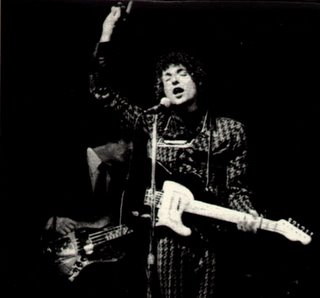 I will not, however, accept any disagreement about Bob Dylan.
Au revoir
I will not, however, accept any disagreement about Bob Dylan.
Au revoir
Rillington Place, Evans, Christie, Hanratty, Pierrepoint, Executions, Kennedy, Foot, Fingerprints and McKie The heading could practically be your local football team being read out. But it isn't - it's just a list of some of the things which have been pre-occupying me recently. In a few days time I am going to put my heart literally into the hands of a surgeon and I am going to do that voluntarily. For a temporary period I am going to be 'switched off', and I'm naturally slightly anxious about that. Three of the people named in the heading were, on the other hand, involuntarily switched off permanently. I imagine their anxiety was greater when the moment came. For those who do not know the histories of Evans/Christie at 10 Rillington Place or James Hanratty at Deadman's Hill on the A6, a brief synopsis is in order:- John Reginald Christie was the occupier of the ground floor flat at 10 Rillington Place, London, during the 1930's and 40's. His hobby was strangling women with a home-made ligature and then having sexual intercourse with them after they were dead. Obviously this was a fairly solitary and secret pastime, the full extent of which was not discovered until Christie was arrested, tried and hanged in 1953. But it was an activity he engaged in fairly frequently between 1938 and 1952, generally disposing of the bodies of his victims under the floorboards or behind the walls of the ground floor flat. Timothy Evans was an illiterate, mentally backward, young man from Wales, who had the great misfortune to move into the flat above Christie's in 1948. Evans and his wife had a young baby daughter and shortly afterwards Mrs Evans became pregnant again - a pregnancy which was unwelcome and Mrs Evans made some enquiries about having an abortion (which was then illegal). John Christie impressed the Evans' with his purported medical knowledge (non-existent) and somehow persuaded them to allow him to perform an abortion on Mrs Evans. This was to be carried out while Mr Evans was at work. The minute Evans went off to work, Christie strangled Mrs Evans and then had sex with her. When Evans returned home Christie told him that the abortion had gone wrong and that his wife had died. Evans initially believed this and was also very impressed by Christie's warnings that they would both be hanged (for participating in/allowing an illegal abortion) if the police became involved. Evans assisted Christie to put the dead body down a manhole. He acceded to Christie's suggestion that he leave London for a time, while Christie would find suitable foster parents for the baby daughter. Evans went off to Wales and Christie promptly strangled the baby and added her body to the pile of corpses in the environs of the house. Three weeks later, wracked by guilt, Evans went to the police station in Merthyr Tydfil, still believing that he had 'killed' his wife by agreeing to 'the abortion' and still believing that his daughter was alive and well. There he made an immediate 'confession' that he'd 'disposed of his wife'. In due course, the police in London found not only the wife's body, but also the daughter's. Had they continued searching they would have found many more corpses - but they were not to know that. Evans was mentally subnormal, and as mentioned, he could neither read nor write. In police custody he did not have the benefit of a solicitor or of a 'responsible adult'. When the police confronted him with the stunning information that his wife had been strangled, and not only that but that his baby daughter had died in the same way, Evans broke down and 'confessed' to both killings. The legal proceedings which followed swiftly (his trial was precisely 6 weeks after his arrest - beat that Lord Bonomy !) are too complex to easily summarise here, but suffice it to say that John Christie was a leading prosecution witness and that the jury took 40 minutes to find Evans guilty of murder. He was sentenced to death. All he could say on hearing his doom pronounced was "It was Christie". Less than 2 months later, after an unsuccessful appeal, Timothy Evans was hanged by Albert Pierrepoint at Pentonville Prison. In 1953 women's bodies were found under floorboards and behind walls in 10 Rillington Place. Christie was arrested and in due course confessed to many murders including that of Mrs Evans. He never confessed to killing the baby - apparently he could easily confront the fact of killing to pursue his hobby, but even he could not stomach the murder of the child which was carried out purely to conceal the murder of the mother. John Christie was hanged by Albert Pierrepoint on the same Pentonville gallows where Evans had met his end 3 years earlier. A fairly clear and appalling miscarriage of justice for poor Timothy Evans you might think. Not so the Cathy, Colin and Jack of their day. Successive Home Secretaries and their Civil Servants resisted any suggestion that there had been a failure of the system, and there was an official refusal to recognise that Timothy Evans had been hanged for a crime he did not commit, which persisted until 1966 when Roy Jenkins, the new Home Secretary, awarded a posthumous pardon to Evans. Even that only came about because of the 1965 book which journalist and broadcaster Ludovic Kennedy wrote about the case, which so persuasively put forward the case for Evans entire innocence. I don't have Kennedy's book to hand as I write, but I can remember that he made the point at the outset that for the convictions and executions of BOTH Evans and Christie to be correct it requires you to accept, as a preliminary coincidence, that 2 men, independently from, and unknown to, each other, were simultaneously engaged in strangling women with ligatures and then having sex with them, IN THE SAME HOUSE, and then concealing the bodies within the structure of the house, without bumping into each other when so doing. As noted, the Home Office were apparently prepared to accept that preliminary coincidence and fought to maintain it for 13 years. For all these years, the Home Office thought there was absolutely nothing untoward in Evans latter confessions having been couched in the language that might be used by a police Inspector, rather than that of an illiterate half-wit. For all these years, the Home Office resisted any suggestion that Evans conviction was unsafe on the grounds that a leading witness against him (who had been incriminated by him) turned out to be the most prolific British serial killer of the 20th century up to that time, and not only that but that 'witness' killed his victims in precisely the same way as Evans had allegedly done. Evans obtained posthumous 'justice' only because of the persausiveness and brilliance of Kennedy and the courage and integrity of Roy Jenkins. Kennedy's book went on to make a general plea that 'confession' evidence was so unreliable that it should never be admissable as evidence of guilt. I will come back to that shortly. Turning briefly to James Hanratty. He was hanged (by our old friend Albert) in 1962 after an atrocious murder, the details of which needn't concern us here. The point is that the major piece of evidence against him was identification of him by an eye-witness to the crime. It is plain that the circumstances in which the witness saw the murderer were far from ideal, it being dark, the witness for the most part sitting in the front of a car with the murderer in the rear and the witness under strict orders not to look at him, and the witness ultimately only getting a 'fleeting glimpse' of the murderer in the dark at a time when she was terrified out of her wits. That identification in these circumstances was the subject of continuing public criticism from the moment of Hanratty's execution for many years afterwards, attracting many celebrities, including John Lennon, to the cause of clearing Hanratty posthumously. Recent developments in forensic science appear to indicate that Hanratty was indeed the murderer, but I will return to that shortly. Suffice it to say, at the moment, that the campaigning journalist Paul Foot wrote a very powerful book (Who Killed Hanratty?) in 1971 marshalling all the then known facts and presenting all the then known arguements. He reached the conclusion that the identification evidence was flawed, that it had led to the execution of an innocent man, and that eye-witness identification evidence was so unreliable that it should not be admissable as evidence of guilt in any criminal trial. So the position is that- Kennedy says no to confessions Foot says no to eye-witness ID How then is any crime supposed to be proved? That is precisely the question which I put to Ludovic Kennedy when I met him in a bookshop in Edinburgh in 1989. He indicated to me that much more reliance should be placed on scientific evidence ('forensics' as he (wrongly) referred to it). He had a touching belief in the ability of dispassionate science to get it right where the fallible humans couldn't. I wonder what he makes of the current fingerprint scandal engulfing the Scottish system. You just knew I would get to fingerprints eventually, didn't you? Really the only point I want to make here is that recent events have made me doubt (a) the worth of any and all 'expert' scientific evidence and (b) the ability of the relevant organs of government to respond effectively when something goes seriously wrong with expert evidence. The Lord Advocate apparently thinks that fingerprints is an inexact science. It's now placed at the voodoo end of the market along with UFOs and crop circles where one expert's positive ID is another's magnified wood-grain on the door-frame. If fingerprint evidence is not an exact science then what is? If we say no to confessions and identifications thanks to Kennedy and Foot then we can now kiss off fingerprints and other 'forensics' courtesy of Boyd. Relegating the 'science' to the status of guesswork is apparently more palatable than exposing the facts of what really happened to public gaze. I said above that recent expert forensic science evidence has shown that Hanratty was the A6 murderer. Read that sentence again. Do you believe it? Are you any more sceptical of a statement like that than you would have been until all the recent fuss about fingerprint evidence? I think that's the measure of the crisis into which we are currently plunged. For myself, blind acceptance of 'expert' evidence is a thing of the past. Were I a juror then I would start from a position of positive disbelief - the 'expert' would have to work very hard indeed to persuade me. And that is because the powers-that-be have patently failed to allay the public's fears about what happened in McKie's case. All one can now say about the SCRO is that they have been portrayed by the Executive as incompetent or criminal or both. It cannot be very pleasant to be a Scottish prosecutor at the moment leading evidence from the SCRO in front of a jury. But we don't need an enquiry into Shirley McKie's case for the same sort of reasons that it took 13 years to pardon poor Timothy Evans - ie politicians and their advisers would rather kill their own grannies than admit that they'd made an arse of things. Right, all of that's off my chest - I can go and have heart surgery now.
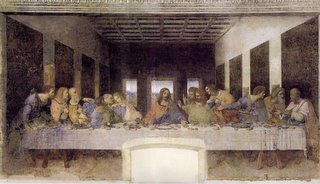 I see that the High Court in London is arbitrating on the plagiarism dispute between the authors of 'The Holy Blood and the Holy Grail' and Dan Brown, author of the blockbusting 'Da Vinci Code'. Or as the case is known in the court papers -
The authors of a pile of preposterous old tosh
vs
The author of another even more preposterous pile of old tosh.
Brown's book is atrociously-written but mildly enjoyable bollocks. Some people obviously think there's some truth in the central theory (that J. Christ was married to M. Magdalene) and countless half-wits have been crawling over places like our very own Roslyn Chapel to 'read the runes' which allegedly contain details of this secret.
Now here's what I want to know:
If Jesus existed
And if he was divine
And if he had disciples
And if one of them was a woman (as allegedly depicted in Da Vinci's painting above, sitting on J's right hand side)
And if that woman was Mary Magdalene
And if Jesus and Mary were married
And if they had children
And if these children had children
And they begat and begat yea even unto the century which is called the 21st
Who gives a f*ck?
And why on earth would the Catholic Church, the Vatican, Opus Dei, The Knights Templar, Uncle Tom Cobley and all think this 'secret' was important enough to slaughter everyone who knew about it?
And, much more importantly, now that Dan Brown knows about it, why the f*ck have they not slaughtered him?
I see that the High Court in London is arbitrating on the plagiarism dispute between the authors of 'The Holy Blood and the Holy Grail' and Dan Brown, author of the blockbusting 'Da Vinci Code'. Or as the case is known in the court papers -
The authors of a pile of preposterous old tosh
vs
The author of another even more preposterous pile of old tosh.
Brown's book is atrociously-written but mildly enjoyable bollocks. Some people obviously think there's some truth in the central theory (that J. Christ was married to M. Magdalene) and countless half-wits have been crawling over places like our very own Roslyn Chapel to 'read the runes' which allegedly contain details of this secret.
Now here's what I want to know:
If Jesus existed
And if he was divine
And if he had disciples
And if one of them was a woman (as allegedly depicted in Da Vinci's painting above, sitting on J's right hand side)
And if that woman was Mary Magdalene
And if Jesus and Mary were married
And if they had children
And if these children had children
And they begat and begat yea even unto the century which is called the 21st
Who gives a f*ck?
And why on earth would the Catholic Church, the Vatican, Opus Dei, The Knights Templar, Uncle Tom Cobley and all think this 'secret' was important enough to slaughter everyone who knew about it?
And, much more importantly, now that Dan Brown knows about it, why the f*ck have they not slaughtered him?
Regular readers will be gagging for more Chuck Bukowski. Here's one called what seems to be the trouble, gentlemen? the service was bad and the bellboy kept bringing in towels at the wrong moment drunk, I finally clubbed him along the side of the head. he was a little man and he fell like an October leaf. quite done, and when the fuzz came up I had the sofa in front of the door, and the chain on, the 2nd movement of Brahms' First Symphony and had my hand halfway up the ass of a broad old enough to be my grandmother and they broke the god damned door, pushed the sofa aside; I slapped the screaming chippy and turned and asked, what seems to be the trouble, gentlemen? and some young kid who had never shaved brought his stick down against my head and in the morning I was in the prison ward chained to my bed and it was hot, the sweat coming down through the white senseless sheet, and they asked all sorts of silly questions and I knew I'd be late for work which worried me immensely
A couple of years ago Ringo Starr published ( in aid of charity) a book of postcards which he'd received from his Beatle colleagues over the years.
Here's one which may be of interest to any Campbeltonians reading this - a postcard from Paul to Ringo
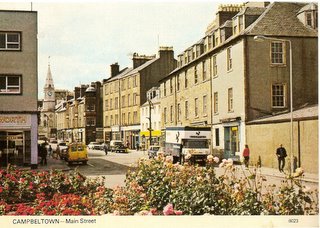 Below is the reverse of the card and it appears from the caption that Ringo was less than wholly impressed with the picturesque view of Campbeltown Main Street. I agree. We could have done with seeing a bit more of Woolworths. (click on the pictures to enlarge)
Below is the reverse of the card and it appears from the caption that Ringo was less than wholly impressed with the picturesque view of Campbeltown Main Street. I agree. We could have done with seeing a bit more of Woolworths. (click on the pictures to enlarge)
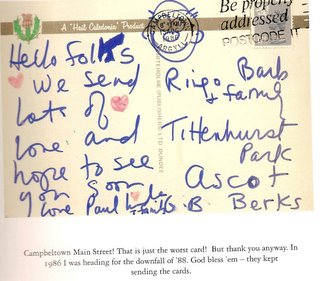
Ten thousand police officers on duty for the G8 summit at Gleneagles faced untold danger at the hands of marauding international anarchists, terrorists, protesters, hippies, dippies, crusties, freakies, wackies and crackies. Praise God, very little damage was caused to anyone or anything, with the exception of one horrifying incident - let today's Scotland on Sunday take up the story :
"HE MAY be the most powerful man in the world, but proof has emerged that President George Bush cannot ride a bike, wave and speak at the same time.
Scotland on Sunday has obtained remarkable details of one of the most memorably bizarre episodes of the Bush presidency: the day he crashed into a Scottish police constable while cycling in the grounds of Gleneagles Hotel.
The incident, which will do little to improve Bush's accident-prone reputation, began when he took to two wheels for a spot of early-evening exercise during last year's G8 summit at the Perthshire resort.
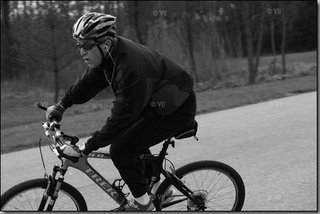 After a hard day's discussion with fellow world leaders, the president was looking for some relaxation. Instead, he ended up the subject of a police report :-
"[At] about 1800 hours the President approached the junction at speed on the bicycle. The road was damp at the time. As the President passed the junction at speed he raised his left arm from the handlebars to wave to the police officers present while shouting 'thanks, you guys, for coming'.
"As he did this he lost control of the cycle, falling to the ground, causing both himself and his bicycle to strike [the officer] on the lower legs. [The officer] fell to the ground, striking his head. The President continued along the ground for approximately five metres, causing himself a number of abrasions. The officers... then assisted both injured parties." "
Obviously friend Tony must've come to George's assistance otherwise he would ordinarily have been charged with a number of offences under the Police (Scotland) Act.....and a couple of thefts by olp.
After a hard day's discussion with fellow world leaders, the president was looking for some relaxation. Instead, he ended up the subject of a police report :-
"[At] about 1800 hours the President approached the junction at speed on the bicycle. The road was damp at the time. As the President passed the junction at speed he raised his left arm from the handlebars to wave to the police officers present while shouting 'thanks, you guys, for coming'.
"As he did this he lost control of the cycle, falling to the ground, causing both himself and his bicycle to strike [the officer] on the lower legs. [The officer] fell to the ground, striking his head. The President continued along the ground for approximately five metres, causing himself a number of abrasions. The officers... then assisted both injured parties." "
Obviously friend Tony must've come to George's assistance otherwise he would ordinarily have been charged with a number of offences under the Police (Scotland) Act.....and a couple of thefts by olp.

In 1962 Bob Dylan sang of a fictionalised telephone conversation with President Kennedy, He said, "My friend Bob, what do we need to make the country grow" I said, "My friend John,............Brigitte Bardot, Anita Ekberg Sophia Loren Country'll grow" Just after being elected, President George W Bush was asked what was needed to make the country grow, and responded, "If the terriers and bariffs are torn down, this economy will grow."
Separated at birth
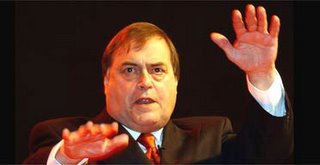 See, eh basically it's a game of two halves. My client's a bit of a space cadet, you know, a bit of a zoomer, and he'd been at the jungle juice, and he got involved wi' a couple o' cowboys fae the Bog, so the ball was well and truly up on the slates, and then when the polis came there was a bit of an amorphous breach, which in fairness he wasn't the prime mover in. Course the cowboys had f***ed off by that time. So, eh, in conclusion it was a bit of a game of two halves
See, eh basically it's a game of two halves. My client's a bit of a space cadet, you know, a bit of a zoomer, and he'd been at the jungle juice, and he got involved wi' a couple o' cowboys fae the Bog, so the ball was well and truly up on the slates, and then when the polis came there was a bit of an amorphous breach, which in fairness he wasn't the prime mover in. Course the cowboys had f***ed off by that time. So, eh, in conclusion it was a bit of a game of two halves
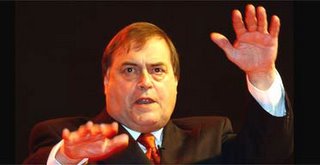 "The objectives remain the same and indeed it has been made clear by the prime minister in his speech yesterday that the objectives are clear, and the one about the removal of the Taliban is not something we have as a clear objective, it is, but is, but is possibly a consequence that as the Taliban clearly giving protection to Bin Laden and the UN resolution made it absolutely clear that anyone who finds them in that position declares themselves as an enemy and that clearly is a matter for these objectives."
"The objectives remain the same and indeed it has been made clear by the prime minister in his speech yesterday that the objectives are clear, and the one about the removal of the Taliban is not something we have as a clear objective, it is, but is, but is possibly a consequence that as the Taliban clearly giving protection to Bin Laden and the UN resolution made it absolutely clear that anyone who finds them in that position declares themselves as an enemy and that clearly is a matter for these objectives."
Click on the above heading to link to the BBC news story "Labour conference backs nuclear" "Hunterston B is scheduled to close in 2011 Delegates at Labour's Scottish conference in Aviemore have endorsed a resolution backing the replacement or renewal of nuclear power stations. The Amicus engineering union, who had called for the move, said it should be part of a balanced energy policy. Labour's coalition deal with the Lib Dems in Scotland states new nuclear power stations will not be built before the issue of waste is dealt with. " New Labour, eh? Crikey, if we're not careful they'll be introducing National Identity Cards and illegally declaring war on foreign countries next. Just exactly what is 'a balanced energy policy'. Is that where only one of your testicles is irradiated with plutonium? Or where only half your family have more than one head?
Here's a book review from TAG 47 (March 1996)
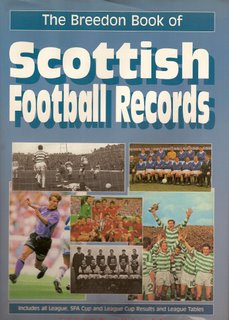 FACTS ARE CHIELS THAT WINNA DING
(This heading is TAG's contribution to the Burns bi-centenary celebrations. Anyone who has any idea what it means should contact the editor immediately.)
The Breedon Book of Scottish Football Records
On Boxing Day when we found Santa wedged in one of the central heating ducts connected to the fake chimney, he was clutching a brightly coloured package addressed to me, and it turned out to contain a copy of ‘The Breedon Book of Scottish Football Records’. This book contains the dates and results of every Scottish League game, every Scottish Cup game and every Scottish League Cup game played between the creation of the universe and the end of the 1994/95 season. A fantastic feast for football fact fiends. The blurb on the dust-jacket notes that football results are more than just mere statistics. It says that they are milestones, not only in a football-watching career but in a very life itself. A candidate for Pseuds Comer or what? Well, yes, except, I agree with the sentiments entirely.
Like every book of this sort it contains its fair share of irritating errors. Without looking too hard I was able to note that there was no reference at all to ES Clydebank's single season in the sun (see elsewhere in this issue for further details). The naming of the losing cup-finalists of 1987 as Dundee without the reasonably important qualification of the word 'United' is annoying if you're the kind of sad person (like me) who gets annoyed easily. Proof that this is a mistake born out of genuine ignorance, rather than a typographical error, is provided when the same gaffe recurs on page 133 when a team photograph is said to be of the Dundee team who finished 5th in the league and were beaten in the fourth round of the cup by Celtic in 1972. Dundee did finish 5th and were beaten by Celtic in the 4th round in that year. The problem is that the photograph is of Dundee United. The clues which alerted me were (a) the presence of Hamish McAlpine, Walter Smith, Tommy Traynor, Dougie Smith, Andy Rolland, Kenny Cameron, Jerry Kerr et al in the photo, (b) the fact that the backdrop is obviously Tannadice, and (c) the real giveaway that the players have badges on their shirts reading 'D.U. F.C'. Apart from that it's an easy mistake to make.
The most glaring error is one which, if it had been made at TAG HQ, would have resulted in the sub-editor being banished permanently to Cliftonhill. On page 102 there's a photograph of a Celtic goal being scored and it's captioned as being their first goal in a 2-0 cup replay win over Rangers. It's such a great photograph that it's pressed into service again on page 189, only this time it's one of Celtic's seven goals in the 1957 League Cup Final. There's also a minor misprint in the Premier Division Table for 1975/76 which records Dundee United's points tally as 52, when in fact they only got 32. Please don't get the idea that I've pored over the whole thing looking for trifling errors. I just happened to notice that one because I wanted to remind myself just how close Dundee Utd (and Aberdeen) came to relegation that season, both surviving on goal difference only. As printed, it looks like United weren't even involved in the dogfight at all.
One other criticism which I'd make of the book is in the choice of photographs. OK, I know that the Old Firm hordes are the biggest part of the football market, but does that really justify having Rangers and Celtic feature in six of the eight photographs on the front and back covers? One of these photographs is of Brian Laudrup. Great player, but hardly synonymous with the history of Scottish football. Inside, there are 80 photographs (yes, I counted them) of which no fewer than 59 feature the Old Firm. Of the remaining 21, ten feature Aberdeen, 3 are of Dunfermline and the two Dundee teams have two each. Which leaves four photos shared out amongst the other approximately 400 teams mentioned in the book. To put this into perspective, there are no photographs at all of about 30 of the current 40 league clubs, while, on the other hand, there are no less than 5 of Mark Hateley. This sort of thing becomes particularly annoying when there are no illustrations to accompany those sparse occasions when one of the 'Mickey Mouse' teams actually did something remarkable. Like, for example, Kilmarnock winning the league in 1965. That page is illustrated by a team photo of Aberdeen who finished 12th, were knocked out of the Cup in the first round by East Fife, and were eliminated from the League Cup in the first round sections, gaining only 5 points from 6 games. More recently, St Mirren' s cup triumph of 1987 is illustrated by a photo of Ally McCoist, while, by contrast, Motherwell's cup winning year of 1991 is illustrated by a photo of, eh, Ally McCoist. Like Hateley, super-Swally manages to chalk up a total of five pictures, even if one of these does show him on crutches.
Revolting pandering to the Old Firm and minor errors aside, this is an excellent book. It is quite amazing how memories can be activated by flicking through the pages recounting the scores of your youth. Everyone can remember the first game they were at. In my case I have to go back nearly 30 years (now 40 - aging blog Ed) to 1967 and Rangers beating Morton 1-0, with Willie Johnston scoring in the very first minute. The league table shows that that was the season when the only game which Rangers lost was the very last one of the season and yet they still finished second. As your eyes flick across to the Scottish Cup results for that year you see that the semi-finalists were Dunfermline, St Johnstone, Hearts and Morton (the last-named having narrowly beaten Elgin City in the quarter-final). Happy days. Apart from the opportunities for maudlin reminiscing which the book provides, it will also finally put a stop to all those arguments about whether East Stirling beat Arbroath by 2-0 or 3-0 in the second round replay in 1934. Every home should have one.
FACTS ARE CHIELS THAT WINNA DING
(This heading is TAG's contribution to the Burns bi-centenary celebrations. Anyone who has any idea what it means should contact the editor immediately.)
The Breedon Book of Scottish Football Records
On Boxing Day when we found Santa wedged in one of the central heating ducts connected to the fake chimney, he was clutching a brightly coloured package addressed to me, and it turned out to contain a copy of ‘The Breedon Book of Scottish Football Records’. This book contains the dates and results of every Scottish League game, every Scottish Cup game and every Scottish League Cup game played between the creation of the universe and the end of the 1994/95 season. A fantastic feast for football fact fiends. The blurb on the dust-jacket notes that football results are more than just mere statistics. It says that they are milestones, not only in a football-watching career but in a very life itself. A candidate for Pseuds Comer or what? Well, yes, except, I agree with the sentiments entirely.
Like every book of this sort it contains its fair share of irritating errors. Without looking too hard I was able to note that there was no reference at all to ES Clydebank's single season in the sun (see elsewhere in this issue for further details). The naming of the losing cup-finalists of 1987 as Dundee without the reasonably important qualification of the word 'United' is annoying if you're the kind of sad person (like me) who gets annoyed easily. Proof that this is a mistake born out of genuine ignorance, rather than a typographical error, is provided when the same gaffe recurs on page 133 when a team photograph is said to be of the Dundee team who finished 5th in the league and were beaten in the fourth round of the cup by Celtic in 1972. Dundee did finish 5th and were beaten by Celtic in the 4th round in that year. The problem is that the photograph is of Dundee United. The clues which alerted me were (a) the presence of Hamish McAlpine, Walter Smith, Tommy Traynor, Dougie Smith, Andy Rolland, Kenny Cameron, Jerry Kerr et al in the photo, (b) the fact that the backdrop is obviously Tannadice, and (c) the real giveaway that the players have badges on their shirts reading 'D.U. F.C'. Apart from that it's an easy mistake to make.
The most glaring error is one which, if it had been made at TAG HQ, would have resulted in the sub-editor being banished permanently to Cliftonhill. On page 102 there's a photograph of a Celtic goal being scored and it's captioned as being their first goal in a 2-0 cup replay win over Rangers. It's such a great photograph that it's pressed into service again on page 189, only this time it's one of Celtic's seven goals in the 1957 League Cup Final. There's also a minor misprint in the Premier Division Table for 1975/76 which records Dundee United's points tally as 52, when in fact they only got 32. Please don't get the idea that I've pored over the whole thing looking for trifling errors. I just happened to notice that one because I wanted to remind myself just how close Dundee Utd (and Aberdeen) came to relegation that season, both surviving on goal difference only. As printed, it looks like United weren't even involved in the dogfight at all.
One other criticism which I'd make of the book is in the choice of photographs. OK, I know that the Old Firm hordes are the biggest part of the football market, but does that really justify having Rangers and Celtic feature in six of the eight photographs on the front and back covers? One of these photographs is of Brian Laudrup. Great player, but hardly synonymous with the history of Scottish football. Inside, there are 80 photographs (yes, I counted them) of which no fewer than 59 feature the Old Firm. Of the remaining 21, ten feature Aberdeen, 3 are of Dunfermline and the two Dundee teams have two each. Which leaves four photos shared out amongst the other approximately 400 teams mentioned in the book. To put this into perspective, there are no photographs at all of about 30 of the current 40 league clubs, while, on the other hand, there are no less than 5 of Mark Hateley. This sort of thing becomes particularly annoying when there are no illustrations to accompany those sparse occasions when one of the 'Mickey Mouse' teams actually did something remarkable. Like, for example, Kilmarnock winning the league in 1965. That page is illustrated by a team photo of Aberdeen who finished 12th, were knocked out of the Cup in the first round by East Fife, and were eliminated from the League Cup in the first round sections, gaining only 5 points from 6 games. More recently, St Mirren' s cup triumph of 1987 is illustrated by a photo of Ally McCoist, while, by contrast, Motherwell's cup winning year of 1991 is illustrated by a photo of, eh, Ally McCoist. Like Hateley, super-Swally manages to chalk up a total of five pictures, even if one of these does show him on crutches.
Revolting pandering to the Old Firm and minor errors aside, this is an excellent book. It is quite amazing how memories can be activated by flicking through the pages recounting the scores of your youth. Everyone can remember the first game they were at. In my case I have to go back nearly 30 years (now 40 - aging blog Ed) to 1967 and Rangers beating Morton 1-0, with Willie Johnston scoring in the very first minute. The league table shows that that was the season when the only game which Rangers lost was the very last one of the season and yet they still finished second. As your eyes flick across to the Scottish Cup results for that year you see that the semi-finalists were Dunfermline, St Johnstone, Hearts and Morton (the last-named having narrowly beaten Elgin City in the quarter-final). Happy days. Apart from the opportunities for maudlin reminiscing which the book provides, it will also finally put a stop to all those arguments about whether East Stirling beat Arbroath by 2-0 or 3-0 in the second round replay in 1934. Every home should have one.
Scotsman.com News - Scale of McKie cover-up revealed Click on the link to read the latest quite shameful and nauseating revelations. In 'Hurricane', our man Bob sang "It can't help but make you feel ashamed To live in a land where justice is a game" Whatever the rights and wrongs of the fingerprint identification (and I still have an open mind pending the public inquiry) it is now as clear as day that those who are obstructing the setting up of an inquiry are engaging in a systematic cover-up, and that cover-up is making them accessories to any criminality which has occurred. The very people who are charged with defending the integrity of our system of justice are currently engaged in undermining it.
The major world religions - Islam, Christianity, Judaism, Buddhism etc - bollocks to the lot of them - fairy stories for the weak-minded - no get a REAL religion - sign up to the Church of the SubGenius - it's only thirty of your American dollars to join, and if you end up going to hell you get a refund of TRIPLE your subscription - that's right - $90 !!! The Church's philosophy is described as follows:- "The Church Of The SubGenius is an order of Scoffers and Blasphemers, dedicated to Total Slack, delving into Mockery Science, Sadofuturistics, Megaphysics, Scatalography, Schizophreniatrics, Morealism, Sarcastrophy, Cynisacreligion, Apocolyptionomy, ESPectorationalism, Hypno-Pediatrics, Subliminalism, Satyriology, Disto-Utopianity, Sardonicology, Facetiouism, Ridiculophagy, and Miscellaneous Theology." Simply click on the heading of this article to find out more and get ready to head for salvation on the freedom train, hallelujah.
 Fanny Hell
A few items ago there was a photograph of pioneering TV chef Mrs F. Craddock together with the celebrated TV presenter's gaffe which made her famous beyond the confines of a TV studio kitchen.
My correspondent, makwuzere, seeks confirmation that the maker of the gaffe was Bill Tennent. Bill was a presenter with STV at Cowcaddens for many years, and allegedly liked a refreshment from time to time, the two activities frequently coinciding. It seems well settled that it was indeed Bill who made the remark, the only issue is whether he was sober at the time. Bill was a very witty and urbane man, and it is entirely possible that he made the remark fully conscious of its comic resonance. The smart money, however, is on it being an unconsciously funny throwaway remark of the sort associated with those who are pleasantly refreshed.
At any event, the debate about the provenance of the remark raised its head in the Scotsman diary a few years ago, and I was able to contribute a story with similar gynaecological overtones.
This featured an occasion when, live on the STV Scottish News at 6pm, one of the young up-and-coming male journalists was to interview an American woman about crocheting, this woman being the acknowledged leading world authority on the subject, and she being in Scotland to give demonstrations. The interview went like this :-
Young man : "So, tell us something about the equipment you need for crocheting".
Loud American Woman: "Well, the most important thing is what I'm sitting on. This is my fanny stool. It's very important to have a comfortable fanny stool".
Young man (crimson) (and nervously): "Ha-ha-ha, I think we should explain to the viewers at home that that word means something different in America than it does here".
Fanny Hell
A few items ago there was a photograph of pioneering TV chef Mrs F. Craddock together with the celebrated TV presenter's gaffe which made her famous beyond the confines of a TV studio kitchen.
My correspondent, makwuzere, seeks confirmation that the maker of the gaffe was Bill Tennent. Bill was a presenter with STV at Cowcaddens for many years, and allegedly liked a refreshment from time to time, the two activities frequently coinciding. It seems well settled that it was indeed Bill who made the remark, the only issue is whether he was sober at the time. Bill was a very witty and urbane man, and it is entirely possible that he made the remark fully conscious of its comic resonance. The smart money, however, is on it being an unconsciously funny throwaway remark of the sort associated with those who are pleasantly refreshed.
At any event, the debate about the provenance of the remark raised its head in the Scotsman diary a few years ago, and I was able to contribute a story with similar gynaecological overtones.
This featured an occasion when, live on the STV Scottish News at 6pm, one of the young up-and-coming male journalists was to interview an American woman about crocheting, this woman being the acknowledged leading world authority on the subject, and she being in Scotland to give demonstrations. The interview went like this :-
Young man : "So, tell us something about the equipment you need for crocheting".
Loud American Woman: "Well, the most important thing is what I'm sitting on. This is my fanny stool. It's very important to have a comfortable fanny stool".
Young man (crimson) (and nervously): "Ha-ha-ha, I think we should explain to the viewers at home that that word means something different in America than it does here". (Approximately half way through that sentence, the young man realised that instead of making things better, he was making it much much worse - but he couldn't stop himself, and as he completed the sentence you could see him thinking "I'm never going to work in television again" - which indeed he didn't).
(Approximately half way through that sentence, the young man realised that instead of making things better, he was making it much much worse - but he couldn't stop himself, and as he completed the sentence you could see him thinking "I'm never going to work in television again" - which indeed he didn't).
Recent posts on this blog may have created the impression that in some way we considered the Scottish rugby team to be a bunch of Edinburgh lawyers and other similar wasters who passed their leisure time drinking each other's urine, and who, every few weeks, took the field and got tanned by foreign urine-drinkers. Events in Edinburgh today have made us realise that in fact the Scottish rugby team is as noble and courageous an assembly of bravehearts as has been seen these three hundred years. Each man a William Wallace for the 21st century. A gathering of pedigree Scotch Beef to set the pipes a-skirling and the lassies a-birling. No praise can be too high for these Caledonian champions, and we are happy to set the record straight. All hail to Scotia's heroes. There'll be a few pints of urine sunk in Rose Street tonight !! And to the defeated English team, a few words of consolation Get it right up yiz, ya ********* *******.
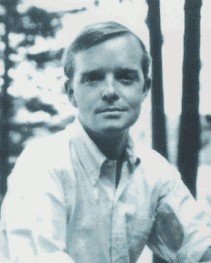 I haven't yet seen the film 'Capote', but I intend to do so at the earliest opportunity.
I first read 'In Cold Blood' when I was a schoolboy, just shortly after it was published. I remember being pulled right into it by the very first sentence,
"The village of Holcomb stands on the high wheat plains of Western Kansas, a lonesome area that other Kansans call 'out there'".
For a bloodthirsty adolescent, it helped that the story was a true one, based on the brutal murder of an entire Kansas family by a couple of travelling psychos in 1959.
At that age, I was entirely untroubled by any moral or ethical debate about the propriety of effectively creating a thriller from real life slaughter. It mattered nothing to me that Truman Capote had interviewed the killers before their judicial executions, and had apparently empathised with them in a way which many found distasteful.
All I knew was that it was an exciting story told by a master teller.
Truman Capote was one of the more notorious writers of the 20th century. He was an overt homosexual in a time when gay men rarely came out of the closet and he was a very witty man. As a result of public feuds with such figures as Jackie Onassis, Norman Mailer and Gore Vidal, he kept himself constantly in the public eye, and he was much in demand as a dinner guest on the beautiful people circuit in New York and elsewhere. His ambition was to write what he called an "epic nonfiction novel." The novel that came as a result of that desire occurred after he and childhood friend Harper Lee (writer of To Kill a Mockingbird) investigated the 1959 murders of a wealthy Kansas ranch family of four. Though initially the pair viewed the project as a simple "whodunit," the far-reaching results of their research had an enormous impact on Capote's life. He put five years of intense research into the book, and in the process developed an intense and complex relationship with the two murderers, Richard Eugene Hickock and Perry Smith. In particular, Smith became a source of fascination to the author, though he is certainly a most disturbing character.
The book was published in 1966. Truman said of it, "Every word is true" (man). Whether it's all true or not, it is still, 40 years later, a book capable of making you feel very uneasy for a whole host of reasons.
Read the book before you see the film, otherwise I suspect that the story of Truman Capote's life, of which the book was the centre, will not make much sense.
I haven't yet seen the film 'Capote', but I intend to do so at the earliest opportunity.
I first read 'In Cold Blood' when I was a schoolboy, just shortly after it was published. I remember being pulled right into it by the very first sentence,
"The village of Holcomb stands on the high wheat plains of Western Kansas, a lonesome area that other Kansans call 'out there'".
For a bloodthirsty adolescent, it helped that the story was a true one, based on the brutal murder of an entire Kansas family by a couple of travelling psychos in 1959.
At that age, I was entirely untroubled by any moral or ethical debate about the propriety of effectively creating a thriller from real life slaughter. It mattered nothing to me that Truman Capote had interviewed the killers before their judicial executions, and had apparently empathised with them in a way which many found distasteful.
All I knew was that it was an exciting story told by a master teller.
Truman Capote was one of the more notorious writers of the 20th century. He was an overt homosexual in a time when gay men rarely came out of the closet and he was a very witty man. As a result of public feuds with such figures as Jackie Onassis, Norman Mailer and Gore Vidal, he kept himself constantly in the public eye, and he was much in demand as a dinner guest on the beautiful people circuit in New York and elsewhere. His ambition was to write what he called an "epic nonfiction novel." The novel that came as a result of that desire occurred after he and childhood friend Harper Lee (writer of To Kill a Mockingbird) investigated the 1959 murders of a wealthy Kansas ranch family of four. Though initially the pair viewed the project as a simple "whodunit," the far-reaching results of their research had an enormous impact on Capote's life. He put five years of intense research into the book, and in the process developed an intense and complex relationship with the two murderers, Richard Eugene Hickock and Perry Smith. In particular, Smith became a source of fascination to the author, though he is certainly a most disturbing character.
The book was published in 1966. Truman said of it, "Every word is true" (man). Whether it's all true or not, it is still, 40 years later, a book capable of making you feel very uneasy for a whole host of reasons.
Read the book before you see the film, otherwise I suspect that the story of Truman Capote's life, of which the book was the centre, will not make much sense.
From today's Scotsman :- Scotsman.com News - Scotland - £50,000 is pledged to Shirley McKie fighting fund: "£50,000 is pledged to Shirley McKie fighting fund A FIGHTING fund has been set up by Shirley McKie's supporters to pay for a private prosecution against fingerprint experts accused of conspiring against her. Two anonymous donors already have pledged £50,000 to help to meet the cost of a private prosecution, the Scotsman has learned. " P45 time approaches for Cathy, Colin and Jack To paraphrase the immortal words of the former RPF at Glasgow, this case is "a public f***ing scandal"
I was browsing through 'the Scots Magazine' (as you do) when I was in the newspaper shop recently, and I saw a wee verse which will appeal to any west coasters reading this (I'm doing this from memory so it might not be 100% accurate) To God belongs the Earth And all that it contains Except for the Western Isles They belong to MacBraynes
For those still wrestling with yesterday's anagram, the answer was, of course George Dubya Bush Congratulations to those who entered, including the winner Nucking Fobody.
NIGHT OF THE HURRICANE
 15 October 1987 - Ann dragged me down to London's Wembley Arena to see Bob Dylan with Roger McGuinn and Tom Petty and the Heartbreakers. I hadn't seen Bob in concert since Earl's Court in '78, and Ann had never seen him so we were both very excited. We were staying at the Charing Cross Hotel in the Strand - quite upmarket for us, but only for that one night, and then back home to Scotland first train in the morning. The Hotel is at the end of the Strand at the junction with Trafalgar Square, Whitehall and the Mall leading to Buckingham Palace.
Wembley Arena is not an ideal venue for rock concerts - primarily because, unles you are very lucky, you will be so far away from the stage that you need a radio-telescope to see the performers. We were a bit further back than that. I had actually bought quite an expensive pair of binoculars for just such an eventuality, but while we were sitting on the Embankment having a sandwich earlier in the afternoon some bas*ard swiped them. Anyway we enjoyed the concert, in the fairly reasonable belief that the ant-sized figure centre-stage was in fact our man Bob, and we retired back to our Hotel, a quick nightcap in the bar and off to bed, with a request for an alarm-call at 7.30am.
I awoke some time later. I was convinced that we'd slept in. I switched on the bed-side light at the side of the bed to check my watch. The light wasn't working. Grumbling furiously, I got out of bed and stumbled towards the toilet. The light in there wasn't working either. Bugger this. I opened the curtain slightly. It was nearly daylight outside - I could read my watch - it was 7.40am. My first reaction was one of annoyance that they'd forgotten to give us our alarm call. Then I noticed something very curious. Our window looked right out onto the opening into Trafalgar Square - this was a Friday morning - it was 7.40am - a time of day when the place I was looking at was one of the busiest places in the World, with a cavalcade of buses, cars, lorries, horses, horse-drawn carriages, motor-cyclists, pedal-cyclists, pedestrians, shoppers, shop-keepers, commuters, tourists, beggars, sight-seers, gypsies, tramps and thieves all pushing and jostling towards their various destinations.
There was no-one there !
There were no buses. No cars. No people.
No sound.
There was nothing.
I put the television on. Not working.
I put the radio on. Static.
I went out into the corridor. It was pitch dark. I felt my way along the wall for some distance but didn't encounter another soul. I was afraid to go too far from the room in case I couldn't find my way back. I was suffering a very serious 'Day of the Triffids' moment.
I went back into the room. Ann was still fast asleep. Right, let's think this through. I cogitated for a few minutes till I arrived at the only solution which made any sense. I roused Ann and said (in words which are quoted back to me on regular occasions) "I do not want to frighten you, darling, but I think there has been a nuclear attack in the middle of the night". It was my Bob Dylan 'Talking World War III Blues' moment. ("the only person left after the war was ME")
Of course, it turned out that although serious, it was not quite as bad as that. Here is the BBC's account of 15/16 October 1987
Hurricane winds batter southern England. Southern Britain has begun a massive clear-up operation after the worst night of storms in living memory.
At least 13 people are known to have died and many dozens have been injured, mostly by falling trees and buildings.
Rescue workers faced an unprecedented number of call-outs as winds hit 94 mph (151 km/h) in the capital and over 110 mph (177 km/h) in the Channel Islands.
15 October 1987 - Ann dragged me down to London's Wembley Arena to see Bob Dylan with Roger McGuinn and Tom Petty and the Heartbreakers. I hadn't seen Bob in concert since Earl's Court in '78, and Ann had never seen him so we were both very excited. We were staying at the Charing Cross Hotel in the Strand - quite upmarket for us, but only for that one night, and then back home to Scotland first train in the morning. The Hotel is at the end of the Strand at the junction with Trafalgar Square, Whitehall and the Mall leading to Buckingham Palace.
Wembley Arena is not an ideal venue for rock concerts - primarily because, unles you are very lucky, you will be so far away from the stage that you need a radio-telescope to see the performers. We were a bit further back than that. I had actually bought quite an expensive pair of binoculars for just such an eventuality, but while we were sitting on the Embankment having a sandwich earlier in the afternoon some bas*ard swiped them. Anyway we enjoyed the concert, in the fairly reasonable belief that the ant-sized figure centre-stage was in fact our man Bob, and we retired back to our Hotel, a quick nightcap in the bar and off to bed, with a request for an alarm-call at 7.30am.
I awoke some time later. I was convinced that we'd slept in. I switched on the bed-side light at the side of the bed to check my watch. The light wasn't working. Grumbling furiously, I got out of bed and stumbled towards the toilet. The light in there wasn't working either. Bugger this. I opened the curtain slightly. It was nearly daylight outside - I could read my watch - it was 7.40am. My first reaction was one of annoyance that they'd forgotten to give us our alarm call. Then I noticed something very curious. Our window looked right out onto the opening into Trafalgar Square - this was a Friday morning - it was 7.40am - a time of day when the place I was looking at was one of the busiest places in the World, with a cavalcade of buses, cars, lorries, horses, horse-drawn carriages, motor-cyclists, pedal-cyclists, pedestrians, shoppers, shop-keepers, commuters, tourists, beggars, sight-seers, gypsies, tramps and thieves all pushing and jostling towards their various destinations.
There was no-one there !
There were no buses. No cars. No people.
No sound.
There was nothing.
I put the television on. Not working.
I put the radio on. Static.
I went out into the corridor. It was pitch dark. I felt my way along the wall for some distance but didn't encounter another soul. I was afraid to go too far from the room in case I couldn't find my way back. I was suffering a very serious 'Day of the Triffids' moment.
I went back into the room. Ann was still fast asleep. Right, let's think this through. I cogitated for a few minutes till I arrived at the only solution which made any sense. I roused Ann and said (in words which are quoted back to me on regular occasions) "I do not want to frighten you, darling, but I think there has been a nuclear attack in the middle of the night". It was my Bob Dylan 'Talking World War III Blues' moment. ("the only person left after the war was ME")
Of course, it turned out that although serious, it was not quite as bad as that. Here is the BBC's account of 15/16 October 1987
Hurricane winds batter southern England. Southern Britain has begun a massive clear-up operation after the worst night of storms in living memory.
At least 13 people are known to have died and many dozens have been injured, mostly by falling trees and buildings.
Rescue workers faced an unprecedented number of call-outs as winds hit 94 mph (151 km/h) in the capital and over 110 mph (177 km/h) in the Channel Islands.
The hurricane had hit the very centre of London, sweeping right up the Strand and zeroing right in to the Charing Cross Hotel, shaking its windows and rattling its walls, while Ann and I slept like babbies. It had knocked out all TV, radio, electrical and telephonic systems in the south-east of England. It had blown down huge oak trees so that no access was possible in most of the main central thoroughfares, including the Strand and Trafalgar Square.
It led to many of Bob's Bootlegs being called "Night of the Hurricane".
In some other quarters it was known as 'the Night of the Fish' - but that is a whole other story
 The Chief Executive continues to explain the Social Security System :-
"Here's the way the system works. Two folks work, they both contribute to the Social Security system. If one dies early, the -- thees, the spouse, the -- remaining spouse gets to choose her benefits or his benefits, which are ever greater, but not both. Think about that system."
In case, by any chance, that wasn't crystal clear, he expands:-
"If you're a two-working family like a lotta families are here in America, and, uhh -- two people working in your family, and the, the spouse dies early -- before 62, for example -- all of the money that the spouse has put into the system, uhh, is gum -- held there, and then when the other spouse retires, he or she gets to choose the benefits from his or her own work, or the other spouse's benefits, which is ever higher but not both."
The Chief Executive continues to explain the Social Security System :-
"Here's the way the system works. Two folks work, they both contribute to the Social Security system. If one dies early, the -- thees, the spouse, the -- remaining spouse gets to choose her benefits or his benefits, which are ever greater, but not both. Think about that system."
In case, by any chance, that wasn't crystal clear, he expands:-
"If you're a two-working family like a lotta families are here in America, and, uhh -- two people working in your family, and the, the spouse dies early -- before 62, for example -- all of the money that the spouse has put into the system, uhh, is gum -- held there, and then when the other spouse retires, he or she gets to choose the benefits from his or her own work, or the other spouse's benefits, which is ever higher but not both."
I again recommend the 'American Leftist' web-site (just click the above heading to get to it) for the quality of wicked humour in its political writing. You don't need to know the complete dramatis personae in what follows to find it amusing:- "What, if Anything, Is the Purpose of Karen Hughes? As far as conservative TV pundits go, I rightly-or-wrongly throw Tucker Carlson into the not-as-bad-as-some-of-them bin because of several endearing statements he's made in the past. One is describing Grover Norquist as a 'mean-spirited, humorless, dishonest little creep' who's like 'the leering, drunken uncle everyone else wishes would stay home'. Another is the following query to a Salon interviewer, 'I don't know who would want to watch that shit. Do you?', the shit in question being The O'Reilly Factor. But amusing slams aside, Carlson's most interesting piece and major claim on not-completely-evil-ness is his Talk Magazine interview with then-Governor George W. Bush in which he (a) describes Bush mocking the final pleas of a woman he has condemned to death and (b) describes Bush swearing like a sailor. Not very surprisingly (b) caused more of a stir than (a) among Bush's evangelical base. "
 Thanks to the web-sites named for the photo - visit these web-sites for more information - www.campbeltown.info
www.visitkintyre.info
Thanks to the web-sites named for the photo - visit these web-sites for more information - www.campbeltown.info
www.visitkintyre.info
 From the pages of Viz - the Ultimate Swearing Dictionary - Roger's Profanisaurus
Well, it is disgusting and profane, and foul-mouthed, and crude, and disgusting, and shocking, and revolting, and obscene, and lewd, and ooh you are awful, and did I mention disgusting, and the funniest book ever written by mortal man.
Roger Mellie dedicates the book to "my darling girlfriend Candy, who, twenty minutes after the tragic death of my wife, showed me it was possible to love again. And again, twenty minutes later".
I was going to give some examples from the book but I find that all my favourites are far too obscene to quote in a public place. Like 'mapatasi' (the definition in the book makes me blush, but have a look at an Atlas for Tasmania, then pronounce 'mapatasi' in an Australian accent, and have a guess at what it means).
(see map of Tasmania here -http://www.designshare.com/articles/1/125/tasmania.jpg)
Buy this book.
From the pages of Viz - the Ultimate Swearing Dictionary - Roger's Profanisaurus
Well, it is disgusting and profane, and foul-mouthed, and crude, and disgusting, and shocking, and revolting, and obscene, and lewd, and ooh you are awful, and did I mention disgusting, and the funniest book ever written by mortal man.
Roger Mellie dedicates the book to "my darling girlfriend Candy, who, twenty minutes after the tragic death of my wife, showed me it was possible to love again. And again, twenty minutes later".
I was going to give some examples from the book but I find that all my favourites are far too obscene to quote in a public place. Like 'mapatasi' (the definition in the book makes me blush, but have a look at an Atlas for Tasmania, then pronounce 'mapatasi' in an Australian accent, and have a guess at what it means).
(see map of Tasmania here -http://www.designshare.com/articles/1/125/tasmania.jpg)
Buy this book.
(Clydebank Blitzed - Part 2) Kilbowie Kasuals. There's a spit and sawdust pub about 200 yards from Kilbowie which I will not name to protect the inebriated. On my second visit to see the Bankies I stopped in there for a quick pint. It was packed to the gunwhales with people drinking haufs and hauf-pints and paying particularly close attention to the horse racing on the TV. I naively thought that the patrons of this pub were, like me, on their way to the game, as the conversation occasionally passed from the prospects at Kempton Park to the prospects at Kilbowie Park. It was only on my return there after the game that I realised that the entire clientele was still exactly the same as it had been two hours earlier, except that those on bar stools had slipped that bit further down below bar level, those who had been standing now required the assistance of the wall to remain upright, and any semblance of coherent speech was a thing of the past. There was one wee man that I'd actually spoken to before the game, and at that time he gave all the indications that he was a lifelong Bankie fan on his way to the game. But now he was completely steaming. When he saw me he seemed to speak on behalf of everybody in the bar when he said, "The bashtardsh got beat again. That'sh why I never go to watch them". Clydebank was blitzed during the war. Many of its citizens have been blitzed ever since. On the other hand, the youth of the town seem to have been raised with the words of Bob Dylan ringing in their ears, viz "Everybody must get stoned". Over the years I've watched several generations of spotty Clydebank Herberts engaging in the quaint post-match ritual of bombarding opposing fans with half-bricks. The favoured venue for this sport is Singer railway station, where there's a convenient embankment above the platform which appears to have been designed specifically as a launch-pad. The Herberts have a captive audience, and it seems to matter not a whit to them that the invariable recipients of their hurled masonry are old women who've been shopping at the town's large shopping centre (your average football fan being nimble enough in mind and body to take cover behind the nearest pensioner). The police seem to be baffled by it all because I've never yet seen a policeman trying to stop it happening, though of course after the game the plods have their work cut out moving people in directions they don't want to go in. Crap, Crap, Crap The infrequent visitor to Kilbowie will find that for the past few seasons there's been an amazing piece of surreal art positioned along the side of the pitch. The first time I saw this monstrosity I was genuinely puzzled. Part of it consisted of a giant advertising hoarding containing the single word 'Wet'. I gazed at it for about ten minutes wondering what on earth it was supposed to mean. I rejected the notion that it was a 'wet paint' sign with a word missing, primarily because it was too high up for anyone to touch it, and it wasn't attached to anything which could have been painted. Similarly I dismissed the thought that it was a static weather report as for once it wasn't actually raining, and in any case it would have been a major undertaking involving the use of one of the shipyard cranes, to change it to 'Dry' or 'Sunny with occasional showers', as the need arose. Could it be an oblique direction sign for the toilets?, No, it wasn't that either, as the facilities were on the other side of the field. Wet? What did it mean? I fancy myself as a bit of a cryptic crossword expert and I was deploying all my feeble mental resources in cracking this particular riddle when I glanced further along the pitch and saw another two exactly similar signs. OK, Wet Wet Wet. I haven't really paid much attention to the hit parade since the Big Bopper took-the final aeroplane ride, but even I have heard of 'the Wets'. They're fae Clydebank and they sponsor the club. That Marty Pillow never misses a home game (sarcasm intended). It's fortunate that neither Dave Dee, Dozy, Beaky, Mick and Tich nor the New Riders of the Purple Sage originated from Clydebank.
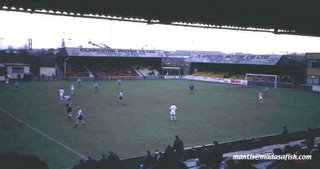 What else can I tell you? Well, for one thing I was fortunate enough to be attending Clydebank games when Gerry McCabe was at his peak. Gerry was the best player in Scotland for a couple of seasons, though, of course, you wouldn't have found that out by reading the Daily Record. By the time he ended up playing for Dumbarton he was well past his best, but I cherish the memories of him regularly making monkeys out of more famous and more illustrious 'opponents in his Bankie days. I also had the privilege of seeing Jim 'Chic' Charnley entering the senior stage. Chic was a bona fide nutcase from the start, though regrettably he's another that ended up at Boghead when his future was behind him. There are thousands of tales which illustrate Chic's lunacy, but one goal of his always sticks in my mind. The Bankies were playing Hamilton Accies at Kilbowie on the last day of the season. The Accies were already certain of promotion to the Premier League and their fans were in party mood. Charnley tore them apart and finished it all off with a dramatic piece of theatre of cruelty. He was on the end of a sweeping move which had completely cut out the goalkeeper, and merely required him to tap the ball into the empty net. That was far too simple for Chic, and he stopped the ball on the goal line and beckoned on the sprawling Accies keeper to come and get it. For a few seconds the hapless keeper lay on the ground practically begging Chic to put him out or his misery and put the ball in the net. Chic just stood with his foot on the ball and a big grin on his face. Suddenly the demented custodian made a desperate lunge at Chic's feet, but too late, as Chic had nudged it over the line and was wheeling away doing aeroplanes while not, of course, forgetting to give copious v-signs with both hands to the enraged Accies followers.
Finally, my favourite memory of Clydebank has nothing to do with football. Every night for 6 years I got the train from Glasgow to Dumbarton. The train passed through, but did not stop at, Clydebank. One night it slowed down and actually stopped there for some unknown reason. There were two old women sitting on a bench on the platform. They got up and pressed the button to open the train doors. The doors didn't open. One of them went along towards the train driver, shouting, "Coo-ee. Coo-eee, driver, the door won't open". The driver, who had obviously not been to the BR charm school, but who did have a well-developed sense of the absurd, replied, "We don't stop here". The totally baffled look on the old dears' faces, as they wrestled with this Zen paradox, was a real treat. Can I use this story as a metaphor for the football club? -
What else can I tell you? Well, for one thing I was fortunate enough to be attending Clydebank games when Gerry McCabe was at his peak. Gerry was the best player in Scotland for a couple of seasons, though, of course, you wouldn't have found that out by reading the Daily Record. By the time he ended up playing for Dumbarton he was well past his best, but I cherish the memories of him regularly making monkeys out of more famous and more illustrious 'opponents in his Bankie days. I also had the privilege of seeing Jim 'Chic' Charnley entering the senior stage. Chic was a bona fide nutcase from the start, though regrettably he's another that ended up at Boghead when his future was behind him. There are thousands of tales which illustrate Chic's lunacy, but one goal of his always sticks in my mind. The Bankies were playing Hamilton Accies at Kilbowie on the last day of the season. The Accies were already certain of promotion to the Premier League and their fans were in party mood. Charnley tore them apart and finished it all off with a dramatic piece of theatre of cruelty. He was on the end of a sweeping move which had completely cut out the goalkeeper, and merely required him to tap the ball into the empty net. That was far too simple for Chic, and he stopped the ball on the goal line and beckoned on the sprawling Accies keeper to come and get it. For a few seconds the hapless keeper lay on the ground practically begging Chic to put him out or his misery and put the ball in the net. Chic just stood with his foot on the ball and a big grin on his face. Suddenly the demented custodian made a desperate lunge at Chic's feet, but too late, as Chic had nudged it over the line and was wheeling away doing aeroplanes while not, of course, forgetting to give copious v-signs with both hands to the enraged Accies followers.
Finally, my favourite memory of Clydebank has nothing to do with football. Every night for 6 years I got the train from Glasgow to Dumbarton. The train passed through, but did not stop at, Clydebank. One night it slowed down and actually stopped there for some unknown reason. There were two old women sitting on a bench on the platform. They got up and pressed the button to open the train doors. The doors didn't open. One of them went along towards the train driver, shouting, "Coo-ee. Coo-eee, driver, the door won't open". The driver, who had obviously not been to the BR charm school, but who did have a well-developed sense of the absurd, replied, "We don't stop here". The totally baffled look on the old dears' faces, as they wrestled with this Zen paradox, was a real treat. Can I use this story as a metaphor for the football club? -
Clydebank - it's got a station but the trains don't stop there! (Note by 2006 Ed - Regrettably, extending the metaphor, Clydebank doesn't even have a station now. Kilbowie Park is long gone and so is the senior club) Note - the picture of Kilbowie used above comes from the excellent series of pictures of deceased Scottish football grounds here- http://www.netcomuk.co.uk/~jblair/grounds.html
If you click on the above it should transport you to one of these web-sites which specialise in instantaneous anagrams of people's names. As it happens, I do discriminate against these wee ghosties and other things that go bump in the night - which is just as well because the above heading is an anagram of MY name. Competiton time - whose name is an anagram of Oh ! abused buggery First name drawn out of the hat receives fack ull
This caught my eye on tonight's BBC web-site. "A farmer accused of keeping "wild boar" without a licence has been acquitted after a sheriff ruled the animal did not exist in the UK." Now if you use the word 'wild' in its Campbeltonian sense ( ie meaning 'very' or 'tremendous(ly)', as in "that's a wild tame dog you've got there, Erchie")..... and you alter the spelling of 'boar' to 'bore'....... then it would NOT be true to say that such an animal does not exist in the UK There are in fact thousands of them in Scotland alone. Many of them are Sheriffs. And some others keep weblogs
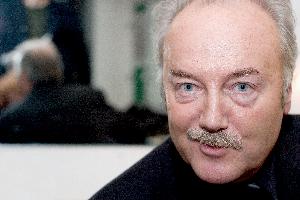 And I shertainly like pushy galore. Thatsh very true
But no, I'm just plain old George.
Here, did you know that the film 'The Madness of King George' was originally titled 'The Madness of George III' but they had to change it because the Americans would've thought they'd missed Parts 1 and 2.
Cheerio, comrades
And I shertainly like pushy galore. Thatsh very true
But no, I'm just plain old George.
Here, did you know that the film 'The Madness of King George' was originally titled 'The Madness of George III' but they had to change it because the Americans would've thought they'd missed Parts 1 and 2.
Cheerio, comrades
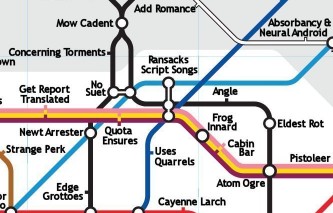 A person of considerable genius spent their time reformulating the London Underground map to anagrammatise (is that a word?) all the Tube station names.
His/her reward? The original posting on the net has been replaced by a notice from London Transport's lawyers who have had the spoof removed. Presumably for fear that foreign tourists (or foreign terrorists) would think it was the real thing.
A person of considerable genius spent their time reformulating the London Underground map to anagrammatise (is that a word?) all the Tube station names.
His/her reward? The original posting on the net has been replaced by a notice from London Transport's lawyers who have had the spoof removed. Presumably for fear that foreign tourists (or foreign terrorists) would think it was the real thing.
I've just come across an example of the kind of writing which I really love - this from US weblog 'American Leftist', http://amleft.blogspot.com/ Rumsfeld just told Charlie Rose that the program to pay Iraqi newspapers to run pro-America articles had been killed just after the press brought it to light, and the LA Times forced him to retract the statement, which wasn't hard given that it was, you know, totally false.
Since I am about to renew my acquaintance with Clydebank, I thought it might be appropriate to revisit my article from TAG 47 (March 1996). It's a lengthy article in two instalments - tune in for the second thrilling instalment tomorrow CLYDEBANK BLITZED
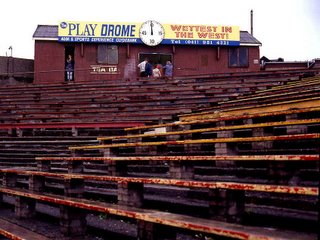 (photo from http://www.homesoffootball.co.uk)
In TAG 44 the editor appealed for somebody somewhere to write something, anything, about Clydebank FC. I've watched out for the resulting flood of articles in issues 45 and 46, but so far, nothing. In the absence of any Bankie fans stepping forward to do the job, emergency measures are called for, and so this is a view of Clydebank from a person who has only been at Kilbowie Park on a handful of occasions over the last six or seven years, and has practically no knowledge at all of the current set-up there. More poignantly, it's the view from a Dumbarton supporter, and you all know that it's notoriously difficult for a Sons fan to think of the word 'Bankie' without following it with the word 'bas**rd', but, hey, who said TAG has to be objective or fair?
Born Under a Bad Sign.
Devotees of blues music will be aware that there were two separate, and equally famous, men calling themselves Sonny Boy Williamson. Similarly, Clydebank Football Club has had two totally separate incarnations, the first club of that name having expired in 1931, while the present club which we all know and love was born as recently as 1965. It was a difficult re-birth, which is not really surprising when you consider the unnatural practices which resulted in its conception. Extending this rather disgusting obstetric metaphor, the new club's parents were the Steedman brothers, and the offspring was originally one half of a siamese coupling with East Stirling, which was christened with the distinctly unlovely name of East Stirling Clydebank. Post-natal separation of this gruesome twosome was performed by a judge in the Court of Session. Just in case none of this makes any sense to you, the story is that Jack and Charlie Steedman were directors of East Stirling in the early 1960's, and after a couple of relatively successful seasons, they were desperately looking for ways to increase the size of crowds at home games. They came up with the truly brilliant idea of moving East Stirling lock, stock, and rabbit, up the road to Clydebank.
The geography experts amongst you will have instantly spotted a flaw in this cunning plan, namely that that particular road is rather longer than a hopeful punt up the park, crossing, as it does, several counties, a number of largish towns, a couple of time zones, and a gigantic cultural divide. Just in case any of the 'Shire fans had missed the point, the name of the club was quickly shortened to ES Clydebank, thereby ensuring that memories of its true origins would soon be forgotten. (This is a bit like the more recent occasion when the Halifax Building Society and the Leeds Building Society merged. The Directors of each society solemnly agreed that the name of the new merged company should be a composite of the old names. Thus the Leeds provided the words 'Building Society' while the Halifax chipped in with the words 'The Halifax' so that the new company was named 'The Halifax Building Society'). The ferocious reaction of the east Stirling supporters to this de facto destruction of their club should have been, but wasn't, a lesson to Wallace Mercer when he was pondering a similarly outrageous manoeouver 30 years later.
After months of messy litigation the shareholders at East Stirling triumphed and ES was forensically uncoupled from Clydebank leaving two clubs where there had formerly been one. The Steedmans (or should that be the Steedmen) remained at Clydebank and the Shire were free to wend their merry way towards what we should diplomatically call their present predicament. One consequence of all this is that the record books for 1964/65 contain reference to that ugliest and most misleading of all Scottish football names, East Stirlingshire Clydebank. It's hard enough nowadays to get some people to believe that East Stirling Football Club is located in Falkirk, and not Stirling. It must have been murder trying to explain that Clydebank wasn't in Stirlingshire, Stirlingshire wasn't in Clydebank, the club was named after a county that it wasn't in, neither East Stirling nor Clydebank were anywhere near the town of Stirling, and Clydebank was very much west of Stirlingshire. A nightmare for English groundhoppers.
(photo from http://www.homesoffootball.co.uk)
In TAG 44 the editor appealed for somebody somewhere to write something, anything, about Clydebank FC. I've watched out for the resulting flood of articles in issues 45 and 46, but so far, nothing. In the absence of any Bankie fans stepping forward to do the job, emergency measures are called for, and so this is a view of Clydebank from a person who has only been at Kilbowie Park on a handful of occasions over the last six or seven years, and has practically no knowledge at all of the current set-up there. More poignantly, it's the view from a Dumbarton supporter, and you all know that it's notoriously difficult for a Sons fan to think of the word 'Bankie' without following it with the word 'bas**rd', but, hey, who said TAG has to be objective or fair?
Born Under a Bad Sign.
Devotees of blues music will be aware that there were two separate, and equally famous, men calling themselves Sonny Boy Williamson. Similarly, Clydebank Football Club has had two totally separate incarnations, the first club of that name having expired in 1931, while the present club which we all know and love was born as recently as 1965. It was a difficult re-birth, which is not really surprising when you consider the unnatural practices which resulted in its conception. Extending this rather disgusting obstetric metaphor, the new club's parents were the Steedman brothers, and the offspring was originally one half of a siamese coupling with East Stirling, which was christened with the distinctly unlovely name of East Stirling Clydebank. Post-natal separation of this gruesome twosome was performed by a judge in the Court of Session. Just in case none of this makes any sense to you, the story is that Jack and Charlie Steedman were directors of East Stirling in the early 1960's, and after a couple of relatively successful seasons, they were desperately looking for ways to increase the size of crowds at home games. They came up with the truly brilliant idea of moving East Stirling lock, stock, and rabbit, up the road to Clydebank.
The geography experts amongst you will have instantly spotted a flaw in this cunning plan, namely that that particular road is rather longer than a hopeful punt up the park, crossing, as it does, several counties, a number of largish towns, a couple of time zones, and a gigantic cultural divide. Just in case any of the 'Shire fans had missed the point, the name of the club was quickly shortened to ES Clydebank, thereby ensuring that memories of its true origins would soon be forgotten. (This is a bit like the more recent occasion when the Halifax Building Society and the Leeds Building Society merged. The Directors of each society solemnly agreed that the name of the new merged company should be a composite of the old names. Thus the Leeds provided the words 'Building Society' while the Halifax chipped in with the words 'The Halifax' so that the new company was named 'The Halifax Building Society'). The ferocious reaction of the east Stirling supporters to this de facto destruction of their club should have been, but wasn't, a lesson to Wallace Mercer when he was pondering a similarly outrageous manoeouver 30 years later.
After months of messy litigation the shareholders at East Stirling triumphed and ES was forensically uncoupled from Clydebank leaving two clubs where there had formerly been one. The Steedmans (or should that be the Steedmen) remained at Clydebank and the Shire were free to wend their merry way towards what we should diplomatically call their present predicament. One consequence of all this is that the record books for 1964/65 contain reference to that ugliest and most misleading of all Scottish football names, East Stirlingshire Clydebank. It's hard enough nowadays to get some people to believe that East Stirling Football Club is located in Falkirk, and not Stirling. It must have been murder trying to explain that Clydebank wasn't in Stirlingshire, Stirlingshire wasn't in Clydebank, the club was named after a county that it wasn't in, neither East Stirling nor Clydebank were anywhere near the town of Stirling, and Clydebank was very much west of Stirlingshire. A nightmare for English groundhoppers.
Kilbowie Konfessions
There's no denying that since 1965 Clydebank have been much more successful than East Stirling.** The Bankies have had a couple of forays into the Premier League, and after their initial promotion from the second division they've never been back there. They've caused their fair share of Cup upsets over the years, and they've gained a reputation for bringing through many talented youngsters who are subsequently snapped up by bigger fish, for suitable fees. Off the top of my head I can think Of Davie Cooper, Tommy Coyne, Bobby Williamson, Frank McDougall, eh...Mike Conroy, um...Chic Charnley, and many others that I'll think of in a minute. They had the first all seated stadium in Scotland, far in advance of the Taylor report, albeit that, as Simon Inglis notes in his 'Football Grounds of Great Britain', "the bench seating allows the hardy to continue standing". Oh, and eh, Davie Irons is another one.
When I moved to Dumbarton in 1981 the first game I went to was at Boghead where the Sons went down narrowly to Motherwell, 0-6. A couple of weeks later I travelled the few miles along the road to Kilbowie to see what my other local team were made of. By coincidence, Motherwell were again the visitors. Although the Bankies managed to get on the score sheet, my masochistic streak was well satisfied by Motherwell sneaking in 7 at the other end. Thereafter I attended Kilbowie reasonably regularly for a few years and saw some great games there. There always seemed to be a deluge of goals. I particularly remember one game against Airdrie where it was 3-3 after ten minutes. Another of the joys of visits to Kilbowie was in getting much more than your money's worth in the match programme. I don't know what its like now but in the Eighties it was simply the best in Scotland. Where other programmes might just have stretched to an up-dated league table, the Bankies version bombarded you with pages of statistical analysis which could easily have passed for ICI's annual accounts. Much of the information was obscure, but nevertheless fascinating. It also regularly included reports from Italian/Spanish/Dutch/French football, information about programme collecting, reviews of 'matches to remember', genuinely interesting pen portraits and histories of their opponents, a truly argumentative and ‘no-holds-barred’ correspondence column and much much more. Wherever possible they adopted the old Kinks trick of converting every word beginning with a ‘C’ into a ‘K’, so that sections of the magazine had titles like Kilbowie Komment or the Kilbowie Kartoon etc, prompting Dumbarton supporters to refer to Bankie fans as ‘Kilbowie Ku*ts’. The programme was practically a fanzine before fanzines had been invented. Have I praised it enough? This may well be a major clue as to why TAG has never heard from any Bankie fans. It's distinctly possible that none of them have ever purchased a fanzine because their programme is so good.
Part 2 - tomorrow at the same time
**Footnote by pernickety Editor - this was written in 1996. As at 2006 Clydebank Football Club has long since disappeared from Scottish senior football - it is defunct - or a word that sounds like that. All of that is another story for another day
The observant will have noticed the appearance of a button in the left margin bearing the legend 'B Bloglines'. What is this I hear you ask?.
Waaaall.......when you've got nothing much to do all day but to nosey round the electronic sphere, you come across continual reference to RSS feeds and newsreaders and stuff like that. If you are curious you eventually try to find out what RSS feeds are - and you drive yourself mad in the process....
...but basically (says he when he's not at all sure about this) basically, right, RSS feeds are your actual condensed news from everywhere you want to get news from, know what I mean. Yeah and its not just news news like, it can be news about things that aren't news at all as well if you get my drift - no really, bear with me, you can get stuff about knitting patterns if you want, or record reviews, or the mating habits of hydrangeas, or pretty well anything really.
Bloglines is a newsreader - and its free - if you sign up for it, it asks you to specify from a huge list all the topics you would like to get 'feeds' (ie condensed news/articles) about on demand. You pick all your favourite things and hey presto bloglines pulls all this stuff into a handy browser format, so that you can quickly skim-read and see which articles you actually want to go to and read in full. You just click on any link that interests you and it takes you there. In effect it searches the web so that you don't have to.
Obviously this will only appeal to saddos and maddos, but I think it's pretty cool and wicked, totally wicked, man. And even more mega-wicked than that is that if you come across any other sites offering RSS feeds (of which there is an increasing number) then a couple of clicks of the old moose and that's it incorporated into Bloglines. Sorted. So if you wanna get where it's at, and get down wiv the happenin' sounds, click on the wee Bloglines button, and all will be revealed.
Obviously I'm talking shite here, right, but give it a click and see for yourself.
Underneath is a screnshot showing my computer-screen when using Bloglines - enlarge the picture by clicking on it to see some of the stuff which is available
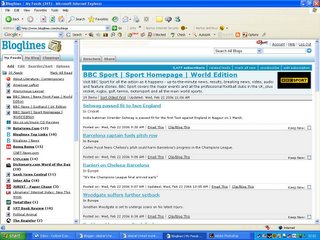
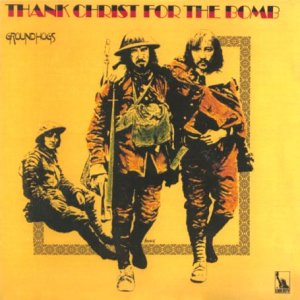
 Numbers 3 and 4 - Thank Christ For The Bomb and Split both by the Groundhogs
For a very brief fleeting period during 1970-72 the Groundhogs were fashionable and these two records were at the core of their appeal. Championed by John Peel, the Groundhogs were a British blues band operating in generally the same area as Cream, Taste and Led Zeppelin. The formula for all of these bands was to take basic delta blues, add a British gloss to it, and then push the genre to its limits, which all of these bands did with varying degrees of success. Both of these albums are good solid British blues-rock, not quite in the same league as Fresh Cream or Led Zeppelin Volume 1, but very enjoyable nevertheless. Probably the heights of acclaim which the Groundhogs reached in the early seventies was not strictly justifed, but neither is the fact that they are completely forgotten or ignored today. Give these discs a clean, get them on the turntable, and give your ears a treat - then put them away again for another 25 years.
Numbers 3 and 4 - Thank Christ For The Bomb and Split both by the Groundhogs
For a very brief fleeting period during 1970-72 the Groundhogs were fashionable and these two records were at the core of their appeal. Championed by John Peel, the Groundhogs were a British blues band operating in generally the same area as Cream, Taste and Led Zeppelin. The formula for all of these bands was to take basic delta blues, add a British gloss to it, and then push the genre to its limits, which all of these bands did with varying degrees of success. Both of these albums are good solid British blues-rock, not quite in the same league as Fresh Cream or Led Zeppelin Volume 1, but very enjoyable nevertheless. Probably the heights of acclaim which the Groundhogs reached in the early seventies was not strictly justifed, but neither is the fact that they are completely forgotten or ignored today. Give these discs a clean, get them on the turntable, and give your ears a treat - then put them away again for another 25 years.
I have just watched the Justice Minister and the Lord Advocate making statements to Parliament about Shirley McKie's case. I obviously have to be fairly circumspect in my comments here, but suffice it to say that nothing said by either of them addressed the main question which troubles the public - in case they have forgotten, here is the question, put as briefly and pithily as I can manage:- How did 6 fingerprint officers manage, independently from each other, to make exactly the same (honest) mistaken identification of the questioned fingerprint? If they cannot or will not answer that question then they should either have a public inquiry or give way to others who can answer the question. I am afraid that this looks increasingly like a cover-up, Watergate-stylee. Cathy Jamieson seems to think that it was all a long time ago and things have changed, so let's move on. But she misses the point. Underlying the above question is the sinister implication that there were people employed (and who are still employed) in the SCRO who were prepared to collaborate in the manipulation and misidentification of fingerprint evidence, for purposes which can only be guessed at. I don't know whether that's true, but at the very least that is the suspicion. While that suspicion remains uncleared then the SCRO will continue to be a pariah in international forensic examination, and Cathy's vision of making it 'world-class' is pie in the sky. Politicians, eh? As Sheriff AJM would say "they come from a culture of dissemblers"
 This one's for Bill, who is inexplicably enjoying this series
(The story so far - at the age of 11, I have spent my first night away from home at Boarding school - now read on)
The next shocker for me was the sound of a hand-bell being rung vigorously at 7am the following morning. The door was kicked open (no door was ever opened in the conventional ‘turn the handle and push gently’ manner) and one of the Chiefs intimated that we had twenty minutes to have our beds made and get ready. Get ready for what? How unprepared I was for boarding school life. This was entirely different from my mother wakening me gently at 8am, with a cup of tea and some toast. I had until then never made my own bed in my life. We had 20 minutes to get up, get washed, get dressed and make our beds etc and, needless to say, failure to comply with this timetable attracted summary punishment.
One thing it took me ages to get the hang of was that your bed had to be made in a particular way (i.e. hospital style). I had never made my bed before and I had never been in a hospital so how the f**k I was meant to know what to do is beyond me. However, the swishing of a red flash sandshoe coming into contact with your buttocks at very high velocity is a tremendous teacher and I soon learned. On that first morning I struggled along as best I could consoled by the fact that we'd soon be seated at breakfast. Not f***ing likely. Another rude awakening awaited. Having got myself ready with a minute or so to spare I was innocently musing as to why anyone would want to get up at 7am. What for? School didn't start till 9am. What are we going to do between now and then? Maybe there will be so much to eat at breakfast that we need an exceptionally long time to digest it all.
The answer came as a very rude shock indeed. I was informed that we were to make our way to "Orderly". Orderly what? What the f**k is "Orderly”? Where is it? One of the other boys in the dormitory approached and advised me that I was to accompany him to the Art Block. I should say a few words about this boy because he made my life miserable for a long time. His name was H and he was from X. H was in fact in his second year at the school, but had somehow contrived, in a class of intellectual pygmies in the previous year, to be so incredibly backward that he required to repeat first year. It should be apparent already that requiring to repeat a year at an academically limited school like ** is an indication of density bordering on the supernatural. However, the big plus factor for H was that having already spent one year at ** he was wise to the system and knew the ropes. He didn't have the hassle of being homesick. He wasn't wondering what ‘Orderly’ was. To give him credit, it was an advantage he ruthlessly exploited while it lasted.
Anyway, I trooped off to the Art Block with the bold H. I have to digress here to observe that the Art Block is no longer there, courtesy of a guy whose name now escapes me, inadvertently (I think) dropping his cigarette butt in amongst some papers while in there for a fly smoke, resulting in the Art Block being burned to the ground. The offender had been expelled and had left the school before the flames were even out, though he made an imaginative and valiant but vain attempt to save himself by mumbling something about “it must have been spontaneous combustion, man.”. The 20 Sovereign and book of matches found in his jacket pocket did not assist his cause. What a glorious day that was. We spent our time dancing like dervishes with unrestrained glee outside the building as the Fire Services fought bravely but unsuccessfully to control the blaze. The deep intense pleasure was comparable only with waking up on the morning after the January gales in 1970 to find that many large oak trees had been blown over during the night and one had by divine intervention cut the English teacher's estate car in half. Oh, joy!!
Anyway, to get back to day one in the Art Block. H informed me that I had to sweep the classroom floors first. There were two classrooms in the block. As it happened, since this was the first day of term the rooms were reasonably tidy, but I had never handled a sweeping brush before and H expressed a good deal of displeasure on this score, comparing me to a number of useless objects of his acquaintance. After issuing his instructions as if he was a Sergeant Major, he went off to take up his own duties, which apparently consisted of reading a comic and picking his nose. Sorry, to be strictly accurate, H looked at the pictures in the comic - "reading" it would have put too much of a mental strain on him. These onerous duties must've had some religious significance for H, because as far as I knew, he performed them every day.
After sweeping the floor I required to move all the desks and chairs to one side of the room and then get down on my hands and knees and apply a horrible sticky liquid floor polish manually to the floor by means of an old rag which nominally passed for the polish applier (very possibly the same one which was used to clear the dining-room tables). The floor itself was lined with linoleum and it was a cardinal rule of the "Orderly" that any passing Fascist thug (Chief) should be able to view his jack-booted reflection gleaming back at him from this surface. To that end every day of my first year I was down on my hands and knees spreading this thick semen-like substance onto the floor. Of course, the stuff got everywhere and you could have seen your reflection in my kneecaps. Having done the easy bit of applying the floor polish I then handed over to H for the heavy-duty part of the double act. Enter H with the "buffer". It's difficult to describe this contraption if the reader has never seen one. It was a sort of huge shoe brush on the end of a swivelling pole that enabled the user to swing the brush end over the floor surface to "buff" it up. Hugh conscientiously discharged his duties by swinging this buffer enthusiastically till the requisite gleam appeared on the floor. I longed to have a shot at buffing and I sometimes asked Hugh if he would like a go at applying the polish. He simply looked at me as though I had made an indecent suggestion and told me to f**k off.
Of course the first day at orderly turned out to be a positive dawdle compared with what followed. You can probably guess why. Since this was the Art Block, when I turned up for ‘orderly’ the next morning I found that the place looked like the aftermath of a rocket attack on a paint factory. It seemed that, not content with making an unholy mess of the canvasses on which they were meant to be painting, the various creepy little budding Van Goghs who inhabited the block during the day had turned their collective attention to the walls, floor and sinks in the classrooms. I suppose that this was all some attempt at post-modern surrealism, but it was a right pain up the arse if you were the poor bug**r who had to remove a Pre-Raphaelite collage which had been daubed on the wall by some juvenile Picasso. Some smart c**t had gifted a Potter's wheel to the school. They should have made that bas***d clean up the mess which his benevolence caused. I never saw anything even remotely resembling a vase or anything like that emanating from the Art Block, but I did see plenty bits of hardened clay roughly hewn into the form of female anatomical parts strewn liberally all over the bloody place.
Of course, H took all this in his stride. Well, he would, wouldn't he, since his job was "buffing" and that couldn't take place until the mess had been cleared up by yours truly. H thus had plenty time for Beano reading and nose picking. Since he had already done a year, H acquired a wholly unjustified pre-eminence in the first four months or so of our first year. Since he knew how everything worked, sucking up to him was a necessity, since among other things he was responsible for picking the rugby and cricket teams to begin with. This was because he was generally the only person who had any previous knowledge of how to play these games. The irony of this was that it turned out that apart from being terminally stupid, H was also congenitally incapable of playing any game even half decently. And yet he was the captain for f**k sake. I'll never forgive the bas***d for not picking me for the cricket team on the sound tactical basis that he hated my guts.
This one's for Bill, who is inexplicably enjoying this series
(The story so far - at the age of 11, I have spent my first night away from home at Boarding school - now read on)
The next shocker for me was the sound of a hand-bell being rung vigorously at 7am the following morning. The door was kicked open (no door was ever opened in the conventional ‘turn the handle and push gently’ manner) and one of the Chiefs intimated that we had twenty minutes to have our beds made and get ready. Get ready for what? How unprepared I was for boarding school life. This was entirely different from my mother wakening me gently at 8am, with a cup of tea and some toast. I had until then never made my own bed in my life. We had 20 minutes to get up, get washed, get dressed and make our beds etc and, needless to say, failure to comply with this timetable attracted summary punishment.
One thing it took me ages to get the hang of was that your bed had to be made in a particular way (i.e. hospital style). I had never made my bed before and I had never been in a hospital so how the f**k I was meant to know what to do is beyond me. However, the swishing of a red flash sandshoe coming into contact with your buttocks at very high velocity is a tremendous teacher and I soon learned. On that first morning I struggled along as best I could consoled by the fact that we'd soon be seated at breakfast. Not f***ing likely. Another rude awakening awaited. Having got myself ready with a minute or so to spare I was innocently musing as to why anyone would want to get up at 7am. What for? School didn't start till 9am. What are we going to do between now and then? Maybe there will be so much to eat at breakfast that we need an exceptionally long time to digest it all.
The answer came as a very rude shock indeed. I was informed that we were to make our way to "Orderly". Orderly what? What the f**k is "Orderly”? Where is it? One of the other boys in the dormitory approached and advised me that I was to accompany him to the Art Block. I should say a few words about this boy because he made my life miserable for a long time. His name was H and he was from X. H was in fact in his second year at the school, but had somehow contrived, in a class of intellectual pygmies in the previous year, to be so incredibly backward that he required to repeat first year. It should be apparent already that requiring to repeat a year at an academically limited school like ** is an indication of density bordering on the supernatural. However, the big plus factor for H was that having already spent one year at ** he was wise to the system and knew the ropes. He didn't have the hassle of being homesick. He wasn't wondering what ‘Orderly’ was. To give him credit, it was an advantage he ruthlessly exploited while it lasted.
Anyway, I trooped off to the Art Block with the bold H. I have to digress here to observe that the Art Block is no longer there, courtesy of a guy whose name now escapes me, inadvertently (I think) dropping his cigarette butt in amongst some papers while in there for a fly smoke, resulting in the Art Block being burned to the ground. The offender had been expelled and had left the school before the flames were even out, though he made an imaginative and valiant but vain attempt to save himself by mumbling something about “it must have been spontaneous combustion, man.”. The 20 Sovereign and book of matches found in his jacket pocket did not assist his cause. What a glorious day that was. We spent our time dancing like dervishes with unrestrained glee outside the building as the Fire Services fought bravely but unsuccessfully to control the blaze. The deep intense pleasure was comparable only with waking up on the morning after the January gales in 1970 to find that many large oak trees had been blown over during the night and one had by divine intervention cut the English teacher's estate car in half. Oh, joy!!
Anyway, to get back to day one in the Art Block. H informed me that I had to sweep the classroom floors first. There were two classrooms in the block. As it happened, since this was the first day of term the rooms were reasonably tidy, but I had never handled a sweeping brush before and H expressed a good deal of displeasure on this score, comparing me to a number of useless objects of his acquaintance. After issuing his instructions as if he was a Sergeant Major, he went off to take up his own duties, which apparently consisted of reading a comic and picking his nose. Sorry, to be strictly accurate, H looked at the pictures in the comic - "reading" it would have put too much of a mental strain on him. These onerous duties must've had some religious significance for H, because as far as I knew, he performed them every day.
After sweeping the floor I required to move all the desks and chairs to one side of the room and then get down on my hands and knees and apply a horrible sticky liquid floor polish manually to the floor by means of an old rag which nominally passed for the polish applier (very possibly the same one which was used to clear the dining-room tables). The floor itself was lined with linoleum and it was a cardinal rule of the "Orderly" that any passing Fascist thug (Chief) should be able to view his jack-booted reflection gleaming back at him from this surface. To that end every day of my first year I was down on my hands and knees spreading this thick semen-like substance onto the floor. Of course, the stuff got everywhere and you could have seen your reflection in my kneecaps. Having done the easy bit of applying the floor polish I then handed over to H for the heavy-duty part of the double act. Enter H with the "buffer". It's difficult to describe this contraption if the reader has never seen one. It was a sort of huge shoe brush on the end of a swivelling pole that enabled the user to swing the brush end over the floor surface to "buff" it up. Hugh conscientiously discharged his duties by swinging this buffer enthusiastically till the requisite gleam appeared on the floor. I longed to have a shot at buffing and I sometimes asked Hugh if he would like a go at applying the polish. He simply looked at me as though I had made an indecent suggestion and told me to f**k off.
Of course the first day at orderly turned out to be a positive dawdle compared with what followed. You can probably guess why. Since this was the Art Block, when I turned up for ‘orderly’ the next morning I found that the place looked like the aftermath of a rocket attack on a paint factory. It seemed that, not content with making an unholy mess of the canvasses on which they were meant to be painting, the various creepy little budding Van Goghs who inhabited the block during the day had turned their collective attention to the walls, floor and sinks in the classrooms. I suppose that this was all some attempt at post-modern surrealism, but it was a right pain up the arse if you were the poor bug**r who had to remove a Pre-Raphaelite collage which had been daubed on the wall by some juvenile Picasso. Some smart c**t had gifted a Potter's wheel to the school. They should have made that bas***d clean up the mess which his benevolence caused. I never saw anything even remotely resembling a vase or anything like that emanating from the Art Block, but I did see plenty bits of hardened clay roughly hewn into the form of female anatomical parts strewn liberally all over the bloody place.
Of course, H took all this in his stride. Well, he would, wouldn't he, since his job was "buffing" and that couldn't take place until the mess had been cleared up by yours truly. H thus had plenty time for Beano reading and nose picking. Since he had already done a year, H acquired a wholly unjustified pre-eminence in the first four months or so of our first year. Since he knew how everything worked, sucking up to him was a necessity, since among other things he was responsible for picking the rugby and cricket teams to begin with. This was because he was generally the only person who had any previous knowledge of how to play these games. The irony of this was that it turned out that apart from being terminally stupid, H was also congenitally incapable of playing any game even half decently. And yet he was the captain for f**k sake. I'll never forgive the bas***d for not picking me for the cricket team on the sound tactical basis that he hated my guts.
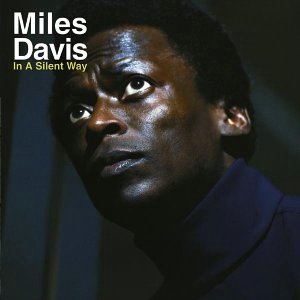 I have included this only as a try-out for a new toy which I discovered in the form of a program called Picasa, which organises all the pictures on your computer in a quite extraordinary way and enables instant transfer of images to your blog - just like this.
Check it out by searching Google for Picasa
And check out Miles as well
I have included this only as a try-out for a new toy which I discovered in the form of a program called Picasa, which organises all the pictures on your computer in a quite extraordinary way and enables instant transfer of images to your blog - just like this.
Check it out by searching Google for Picasa
And check out Miles as well 
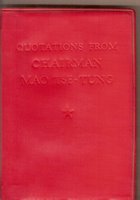
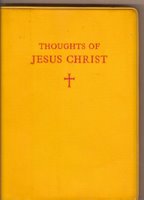 On the left, if you enlarge the photo and look very closely, you can just about make out the inscription on the red book which consists of the words 'QUOTATIONS FROM CHAIRMAN MAO-TSE-TUNG' with a red star underneath. On the right, a bit clearer, the inscription on the yellow book is 'THOUGHTS OF JESUS CHRIST' with a red cross underneath.
When I was about 15 I wrote (from my boarding school) to the Chinese embassy in London and told them that I was thinking of setting up a revolutionary council dedicated to the overthrow of capitalism and the corrupt British state. I asked for help with this project by way of literature and training in insurrectionary activity.
Much to the delight of myself and the rest of the Revolutionary Council (my friend Martin) a parcel arrived a few days later with 50 copies of Mao's wee red book and a whole load of glossy photos of the Chairman himself looking wise and serene. No Kalashnikovs or grenades though, which was a bit disappointing, but at least it was a start. We immediately began recruiting likely cadres to join the 'people's army' (generally this was the thickest boys in the school who thought that waving the wee red book Chinee-style was way cool) with a view to initially torching the place and then marching on London.
Unfortunately I was caught posting a picture of Mao on the main notice board, by one of the Chiefs, who was not apparently sympathetic to the cause, and the revolution came to an end by way of him kicking my arse, ripping up Mao's photo, rounding up the wee red books and setting fire to the lot of them. I managed to save one from the conflagration, which is the one you see here.
The Chief also reported me to the 'duty' teacher. I think he rather hoped that I would be handed over to MI6 and never be seen again. Fortunately for me, the duty teacher, while being a very nasty wee man, was also .....a Christian. He thought that this was an excellent opportunity to save the depraved sinner (me) and wrestle him off the path of damnation and restore him to the path of righteousness. In effect, he proposed that I should study the words of Jesus and nothing more would be said about the abortive attempt to overthrow the capitalist system. Handily, he had the words of Jesus in a wee yellow book, Mao-stylee. This rather suited me, because the MI6 alternative didn't appeal, and even worse was the thought of somebody hitting my hands repeatedly with a leather belt.
So the words of Jesus it was, and that is how I came into possession of the yellow book. Now, some of you maybe think that I'm going to conclude this educational tale by saying that I've been a believer in the gospel ever since. It would be heartwarming, wouldn't it? But no, quite the reverse. I don't believe a word of it.
On the other hand, I see that the juvenile me heavily underlined Mao's exhortation "People of the world, unite and defeat the US aggressors and all their running dogs".
Hmmm......apt for the 21st century or what.
(I suppose that in the present climate some of the foregoing might be sufficient to get me put on the security services phone tap list - memo to them - this is a joke - remember humour? - I do not actually intend to lead a revolution, with Chinese support or otherwise. I do not want to encourage people of the world to unite and defeat the US. I am not, nor have I ever been a member of the Communist Party. I am a 51 year old man with a heart condition. Go and tap somebody else's phone.)
On the left, if you enlarge the photo and look very closely, you can just about make out the inscription on the red book which consists of the words 'QUOTATIONS FROM CHAIRMAN MAO-TSE-TUNG' with a red star underneath. On the right, a bit clearer, the inscription on the yellow book is 'THOUGHTS OF JESUS CHRIST' with a red cross underneath.
When I was about 15 I wrote (from my boarding school) to the Chinese embassy in London and told them that I was thinking of setting up a revolutionary council dedicated to the overthrow of capitalism and the corrupt British state. I asked for help with this project by way of literature and training in insurrectionary activity.
Much to the delight of myself and the rest of the Revolutionary Council (my friend Martin) a parcel arrived a few days later with 50 copies of Mao's wee red book and a whole load of glossy photos of the Chairman himself looking wise and serene. No Kalashnikovs or grenades though, which was a bit disappointing, but at least it was a start. We immediately began recruiting likely cadres to join the 'people's army' (generally this was the thickest boys in the school who thought that waving the wee red book Chinee-style was way cool) with a view to initially torching the place and then marching on London.
Unfortunately I was caught posting a picture of Mao on the main notice board, by one of the Chiefs, who was not apparently sympathetic to the cause, and the revolution came to an end by way of him kicking my arse, ripping up Mao's photo, rounding up the wee red books and setting fire to the lot of them. I managed to save one from the conflagration, which is the one you see here.
The Chief also reported me to the 'duty' teacher. I think he rather hoped that I would be handed over to MI6 and never be seen again. Fortunately for me, the duty teacher, while being a very nasty wee man, was also .....a Christian. He thought that this was an excellent opportunity to save the depraved sinner (me) and wrestle him off the path of damnation and restore him to the path of righteousness. In effect, he proposed that I should study the words of Jesus and nothing more would be said about the abortive attempt to overthrow the capitalist system. Handily, he had the words of Jesus in a wee yellow book, Mao-stylee. This rather suited me, because the MI6 alternative didn't appeal, and even worse was the thought of somebody hitting my hands repeatedly with a leather belt.
So the words of Jesus it was, and that is how I came into possession of the yellow book. Now, some of you maybe think that I'm going to conclude this educational tale by saying that I've been a believer in the gospel ever since. It would be heartwarming, wouldn't it? But no, quite the reverse. I don't believe a word of it.
On the other hand, I see that the juvenile me heavily underlined Mao's exhortation "People of the world, unite and defeat the US aggressors and all their running dogs".
Hmmm......apt for the 21st century or what.
(I suppose that in the present climate some of the foregoing might be sufficient to get me put on the security services phone tap list - memo to them - this is a joke - remember humour? - I do not actually intend to lead a revolution, with Chinese support or otherwise. I do not want to encourage people of the world to unite and defeat the US. I am not, nor have I ever been a member of the Communist Party. I am a 51 year old man with a heart condition. Go and tap somebody else's phone.)
At first I was fantastically excited about the fact that the blog appeared to be searchable - see various posts below. But in fact it turns out that both the 'search this blog' button above and the google blog search are so piss-poor that they are virtually useless. In fact, if you now do a search for 'alastair's heart monitor' on the google blog search, most of the results appear to relate to eastern european porn sites - quite handy if you want to spend Saturday night tied to a tree on the outskirts of Belgrade being intermittently whipped by a buxom fraulein - but otherwise not much good. I e-mailed google's help desk - they're as much good as a chocolate teapot - as before they told me to piss off because they were too busy. So, meantime, don't bother searching. Sorry.
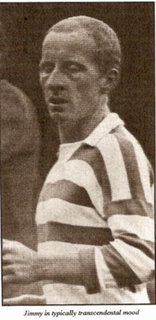 In the interests of balance (which will not often be a guiding principle of this blog) I follow slim Jim with wee Jinky (this from TAG23 May 1991)
THE FORGOTTEN ONES - No 10
JIMMY JOHNSTONE
In the interests of balance (which will not often be a guiding principle of this blog) I follow slim Jim with wee Jinky (this from TAG23 May 1991)
THE FORGOTTEN ONES - No 10
JIMMY JOHNSTONE
Jimmy Johnstone, or to give him his full name, James Jinkworth Johnstone, may well have been the last of the 'tanner-ba' players. By the time his career came to an end, the tanner itself was a fading memory, and a '£3.49 plus VAT ba' player' doesn't quite have the same sort of romantic ring. Proverbially smaller than the corner flag and with a Barlinnie Special Unit haircut years ahead of Jimmy Boyle, Jinky Jim did not at first sight look like the terroriser of defences from Montrose to Milan, but for a period in the sixties and early seventies he was one of that (increasingly) rare breed - a Scottish player of genuine world class. Born in that cradle of Scottish football, Bellshill, he honed his natural ball control skills by lining up milk bottles in his ma's living-room and dribbling the ball round them for hours on end. When he first broke through into the Celtic first team, he found to his surprise, and delight, that the then current Rangers defenders were approximately as mobile and skilful as those milk bottles.
Jinky was undeniably the jewel in the crown of the Lisbon Lions (what aboot wee Bertie? - outraged Ed) and it's a moot point whether Celtic could have made the leap from being an excellent Scottish team to being champions of Europe without his extraordinary ability to tantalise, bemuse, bewilder and break the spirit of even the best the Continent had to offer. In an interview for the TV series "Only A Game?", Tommy Gemmell provided an interesting insight into the tactics of Stein-era Celtic, - "If we wee under pressure, all we did was give the ball to Jimmy because nobody could ever get it off him.....if we were three goals up in a match and we were trying to save energy for a midweek game, give the ball to Jimmy and let him run about with it just to slow the whole tempo of the game down, take it easy......and if we needed someone to break open tight defences we had to give it to Jimmy as well...."
In that same programme, Hugh McIlvanney quoted Billy McNeil as saying, "The only trouble wi' Jimmy is that you've got to make sure he's running in the right direction because if he's coming this way we'll never get the ball off him - he's liable to beat three turnstile men and five of the crowd...."
We can all remember playing football in school playgrounds etc and there was always one wee bas***d who appeared to have the ball tied to his feet. You'd have liked to amputate the wee bug**r's legs with a lunging two-footed tackle except you could never get near enough. Jinky was one of the few who were able to move easily from being an annoying wee shi*e in the playground to being an annoying wee shi*e at Hampden Park. Although many defenders at home and abroad attempted to perform non-surgical limb removal on him, no-one ever truly mastered him. In particular, one remembers the efforts of a succession of Atletico Madrid players to relocate Jimmy's head in the back of the Jungle. As each throat-high tackle felled him, Jimmy's response was merely to pick himself up and run at the defenders inviting yet another red card challenge.
Of course, genius is pain, and not everything in Jinky's garden was rosy. It is said that Bill Shankly once complained to one of his players, "The trouble wi' you son is that your brains are in your heid". No such criticism could be levelled at Jimmy and it's fair to say that an application to join Mensa was never on the agenda. His unusual sense of brainless joie de vivre led him into a number of off-field scrapes, during which bottles of Buckfast and cans of Carlsberg Special played more than a subsidiary role. The most celebrated incident featured Jimmy's unsuccessful attempt to travel to the 1974 World Cup Finals in Germany by boat (a rowing boat in the Clyde, departing Largs 4am). This was only one of many similar occurrences and Jock Stein had practically a full-time job digging the wee man out of a variety of licensed premises. It was said that if Jinky went into any one of fifty bars in Glasgow, the barman would acknowledge him with "The usual, Jimmy?"
A few years ago, Jimmy's autobiography was published (ghost-written of course, we're not dealing with a literary giant here). The book was reviewed in the very first ever edition of the Rangers fanzine 'Follow Follow', and I think it's worth quoting the entire review, because apart from being a very amusing and much more succinct appraisal of the wee man's career than the autobiography itself, it also betrays a sneaking regard and affection for Jinky which you might not expect from that source -
"Ah pure love fitba' an' that, know. The set-up at Parkheid wiz gemme, a new set o' falsers, a Burton's suit, an' sixty quid a week. Mind you ah didnae fancy the doings fae Big Jock an' Caesar fur ma drinkin' an' that. At wan time ah wiz swallin' a ful bottel a Domestos an' that oan the bus goin' tae trainin' in the mornin'. These days am working fur a boay that's a bigger chancer than ah ever wiz. Cheerio Chinas! Whose round is it?"
During his career Jimmy was often compared with George Best. They were both described as free spirits. Or at least they were both usually to be found drinking free spirits. While George graduated to swilling champagne in exclusive London night-clubs and being called the fifth Beatle, Jimmy continued to get blootered on pints of heavy in Lanarkshire spit-and-sawdust dives, while Slade in their skinhead phase would have been the more obvious comparison for him. To quote McIlvanney again, Jimmy undoubtedly added substantially to the gaiety of nations off the field.
On the field he wiz pure magic.
Editorial note - my continuing apologies for the ridiculous censorship of certain innocuous words - but I know from experience that BIG BRUV is watching and the Crown Office censors will stop you viewing this blog if it has any detectable sweary words. I haven't become coy - but I am concerned to ensure that it isn't blocked.
UPDATE I have now had it confirmed that my by-pass operation will be on 3 March at Clydebank. I have to go into the hospital on Wednesday 1 March - so there will be another week of rubbish being posted on this blog, and then you really will have to talk amongst yourselves until I get back. Thanks to everyone for their good wishes - it gives me strength
Cathy Jamieson's entry into the fingerprint debate could hardly have been less impressive. For years, Rory Bremner has been making a living parodying Tony Blair's "Let's Move On - It's time to draw a line under this" response to difficult questions. It's a technique copied by most of Tony's cronies. To see hapless wee Cathy trying a similar stunt today was just very sad for our fledgling devolved state. How can we 'move on' ? Every single taxpayer in Scotland donated approximately 30 pence to Shirley McKie last week. I don't think it's unreasonable that we want to know why. How can we 'move on'? Every fingerprint examination department in the developed world thinks the SCRO is either utterly incompetent or worse, deliberately dishonest. How can we move on? There is a festering sore in the body politic. The reluctance of those responsible to address their minds to curing it could initially be ascribed to simple incompetence and lack of ability. With each passing day it begins to look more and more like concerted, dishonest, criminal cover-up. I do not, however, accuse Cathy Jamieson of deliberate dishonesty. She is far too stupid for that.
 For roughly ten years from about 1988 onwards, I contributed a number of articles to the best football fanzine around, viz: - The Absolute Game.
Here is an example (from TAG 20, October 1990)- more will follow if there is sufficient interest.
The Forgotten Ones - No 7 - Jim Baxter
Picture the scene. The Main Door at Ibrox Stadium at 2pm on a match day circa 1971. Yours truly, a scruffy, spotty schoolboy hanging about outside hoping for a glimpse of the stars. The portals open and the Rangers reserves emerge to board the luxury team coach to travel the short distance to an away game against Clyde at Shawfield. Lagging behind the rest comes a tall, dark-haired individual equipped with the expensive florid complexion and beer-gut of the seasoned drinker. He reaches into his tatty old duffle bag and produces a pair of heavily mud-encrusted boots and proceeds to 'clean' them by battering them off the hallowed red-sandstone building.
This was Jim Baxter towards the end of his second spell with Rangers. Despite his world-wide fame and celebrity he still had time for a few words with me and the othere wee urchins who were staring at him in awe. These few words were "Get oot the f***ing road boys".
Something of my youthful innocence died that day.
Jim Baxter was God when Eric Clapton was still an apprentice cherub trying to figure out how BB King could bend those notes. It's a cliche to say that Slim Jim had everything required of a great Scottish footballer. Outrageously skilled, totally irresponsible, supremely arrogant and thick as mince. Yup, he had it all. Even the fact that he featured in a successful Rangers team did not prevent him being universally admired (ie in the other end of the city as well), mainly due to his glittering performances in the national team. Jim getting both goals in the victory over England at Wembley in '63. Jim making monkeys out of the aristocratic Italians at Hampden in '65. Jim returning to London to rub the 'World Champions' noses in the dirt of Wembley '67.
Great moments all. I become quite light-headed when I hear Billy Bremner telling the story of Jim parading up and down the dressing room before the Italian game saying, "Rivera? Rivera? Ah'll Rivera 'im when we get oot there". And, of course, Jim did totally outshine Gianni Rivera, the biggest Italian superstar of his day.
Where did it all go wrong? A broken leg, a transfer away from Rangers to Sunderland, and the usual cocktail of alcohol, horses, women and Chinese take-aways did for Jim. These elements were merely aggravated by his well-known reluctance to do anything energetic, like turn up for training. His eventual return to Rangers was more in the nature of retirement to an Eventide home than a second coming. The only apt comparison between Baxter, Wembley '67 and Baxter, Shawfield '71, would be with Elvis, Memphis '55 and Elvis, Las Vegas '77. The name was the same, but the man himself was simply a parody of his former greatness. Premature retirement at the age of 30 beckoned, as by that time, in his own inimitable words, "I was getting beat by guys I wouldnae have sh*t on 10 years earlier".
After his retirement Jim set the trend for some present day Ibrox stalwarts to follow by having some unfortunate brushes with the criminal courts. He also trod the well-used path of becoming a publican with himself as his best and most regular customer. Nowadays he occasionally makes the odd TV or radio appearance to reminisce about the old days, when he was, in Ian Archer's phrase, "the greatest Scottish football show on earth".
It is of course not strictly accurate to include Jim in the 'forgotten ones' series. For those of us fortunate to witness it, his performance at Wembley '67 will never be forgotten. Expecting another player like him to emerge in Scotland is as fruitful an exercise as waiting for the new Beatles. We are condemned to a footballing diet of Jive Bunnies. After each fresh humiliation for Roxburgh's boys, why don't you dig out the video of Jim playing keepie-uppie against Ramsay's Robots. He did then what every Scottish boy who has ever lived has wanted to do.
The greatest player that I ever saw? Probably. The greatest player that ever told me to get oot the f***ing road? Definitely.
Footnote - Jim Baxter died, aged 61, in 2001, after having been in very poor health for a long time, principally due to alcohol abuse
For roughly ten years from about 1988 onwards, I contributed a number of articles to the best football fanzine around, viz: - The Absolute Game.
Here is an example (from TAG 20, October 1990)- more will follow if there is sufficient interest.
The Forgotten Ones - No 7 - Jim Baxter
Picture the scene. The Main Door at Ibrox Stadium at 2pm on a match day circa 1971. Yours truly, a scruffy, spotty schoolboy hanging about outside hoping for a glimpse of the stars. The portals open and the Rangers reserves emerge to board the luxury team coach to travel the short distance to an away game against Clyde at Shawfield. Lagging behind the rest comes a tall, dark-haired individual equipped with the expensive florid complexion and beer-gut of the seasoned drinker. He reaches into his tatty old duffle bag and produces a pair of heavily mud-encrusted boots and proceeds to 'clean' them by battering them off the hallowed red-sandstone building.
This was Jim Baxter towards the end of his second spell with Rangers. Despite his world-wide fame and celebrity he still had time for a few words with me and the othere wee urchins who were staring at him in awe. These few words were "Get oot the f***ing road boys".
Something of my youthful innocence died that day.
Jim Baxter was God when Eric Clapton was still an apprentice cherub trying to figure out how BB King could bend those notes. It's a cliche to say that Slim Jim had everything required of a great Scottish footballer. Outrageously skilled, totally irresponsible, supremely arrogant and thick as mince. Yup, he had it all. Even the fact that he featured in a successful Rangers team did not prevent him being universally admired (ie in the other end of the city as well), mainly due to his glittering performances in the national team. Jim getting both goals in the victory over England at Wembley in '63. Jim making monkeys out of the aristocratic Italians at Hampden in '65. Jim returning to London to rub the 'World Champions' noses in the dirt of Wembley '67.
Great moments all. I become quite light-headed when I hear Billy Bremner telling the story of Jim parading up and down the dressing room before the Italian game saying, "Rivera? Rivera? Ah'll Rivera 'im when we get oot there". And, of course, Jim did totally outshine Gianni Rivera, the biggest Italian superstar of his day.
Where did it all go wrong? A broken leg, a transfer away from Rangers to Sunderland, and the usual cocktail of alcohol, horses, women and Chinese take-aways did for Jim. These elements were merely aggravated by his well-known reluctance to do anything energetic, like turn up for training. His eventual return to Rangers was more in the nature of retirement to an Eventide home than a second coming. The only apt comparison between Baxter, Wembley '67 and Baxter, Shawfield '71, would be with Elvis, Memphis '55 and Elvis, Las Vegas '77. The name was the same, but the man himself was simply a parody of his former greatness. Premature retirement at the age of 30 beckoned, as by that time, in his own inimitable words, "I was getting beat by guys I wouldnae have sh*t on 10 years earlier".
After his retirement Jim set the trend for some present day Ibrox stalwarts to follow by having some unfortunate brushes with the criminal courts. He also trod the well-used path of becoming a publican with himself as his best and most regular customer. Nowadays he occasionally makes the odd TV or radio appearance to reminisce about the old days, when he was, in Ian Archer's phrase, "the greatest Scottish football show on earth".
It is of course not strictly accurate to include Jim in the 'forgotten ones' series. For those of us fortunate to witness it, his performance at Wembley '67 will never be forgotten. Expecting another player like him to emerge in Scotland is as fruitful an exercise as waiting for the new Beatles. We are condemned to a footballing diet of Jive Bunnies. After each fresh humiliation for Roxburgh's boys, why don't you dig out the video of Jim playing keepie-uppie against Ramsay's Robots. He did then what every Scottish boy who has ever lived has wanted to do.
The greatest player that I ever saw? Probably. The greatest player that ever told me to get oot the f***ing road? Definitely.
Footnote - Jim Baxter died, aged 61, in 2001, after having been in very poor health for a long time, principally due to alcohol abuse